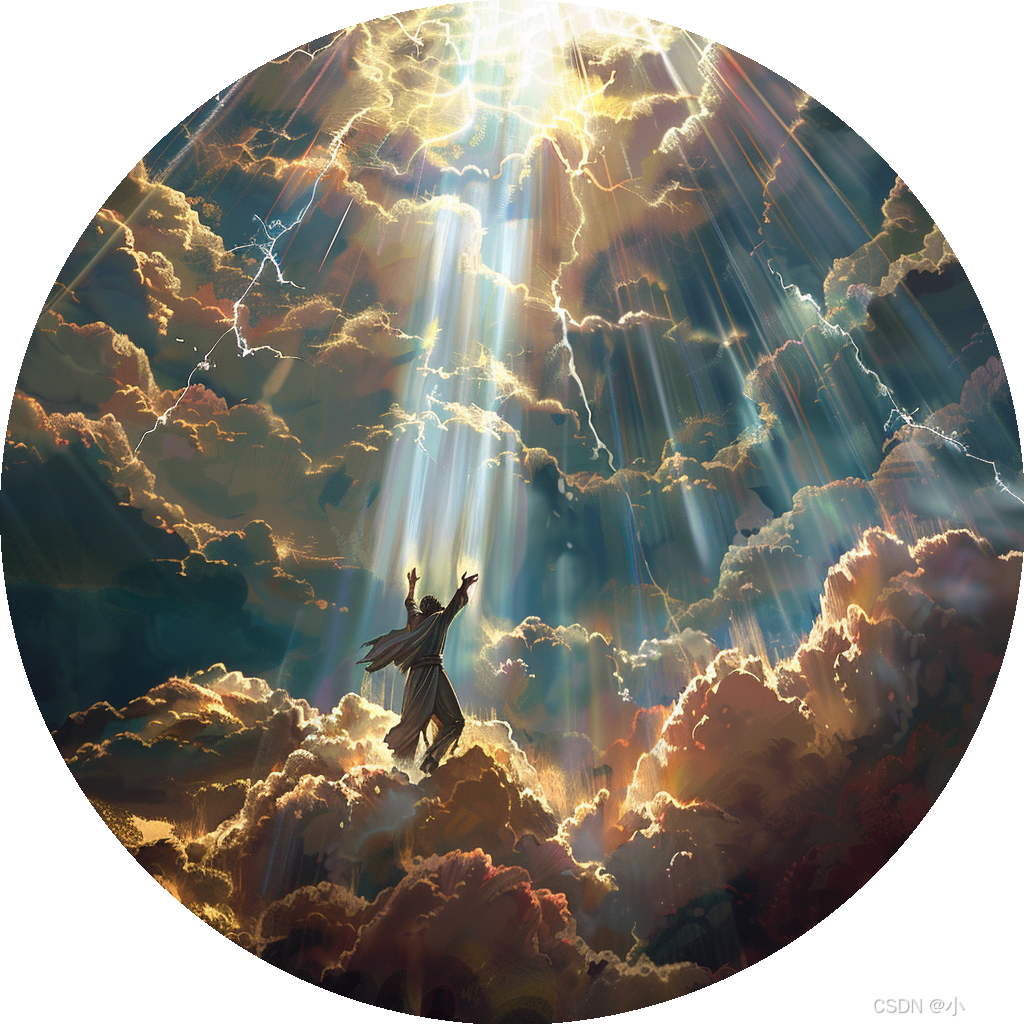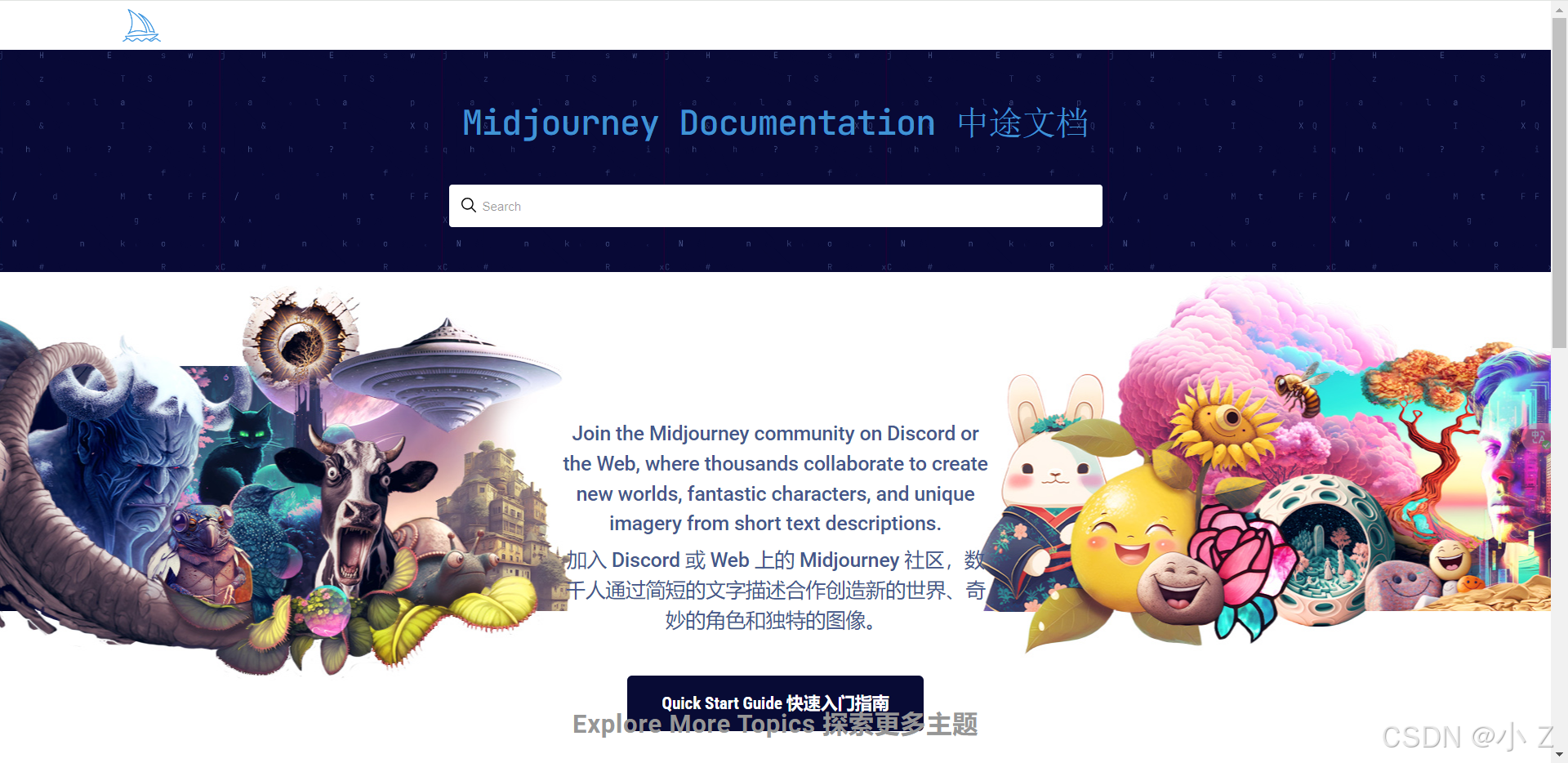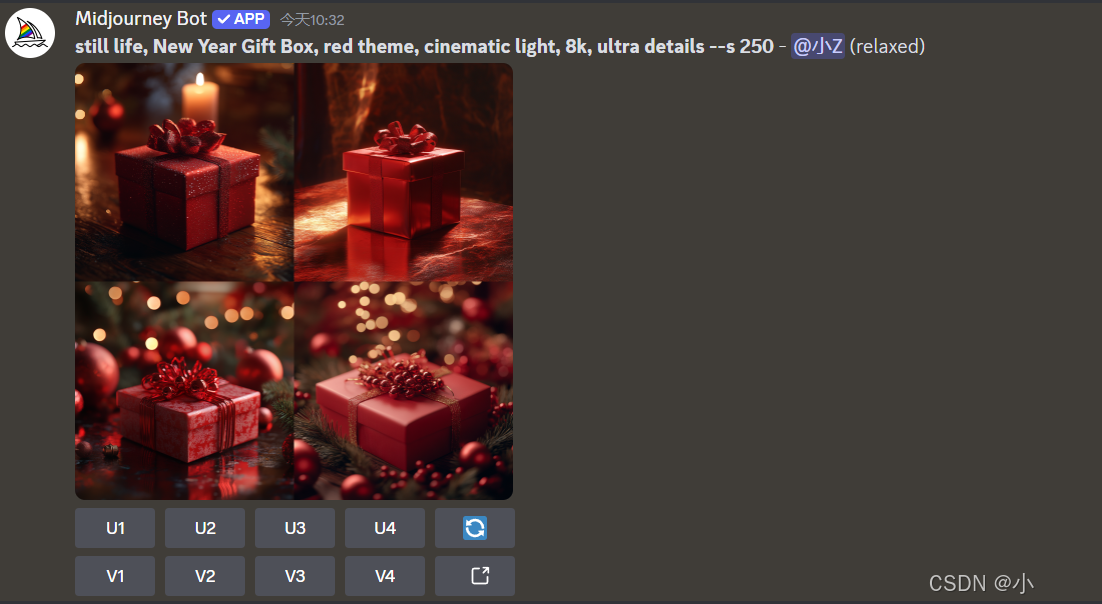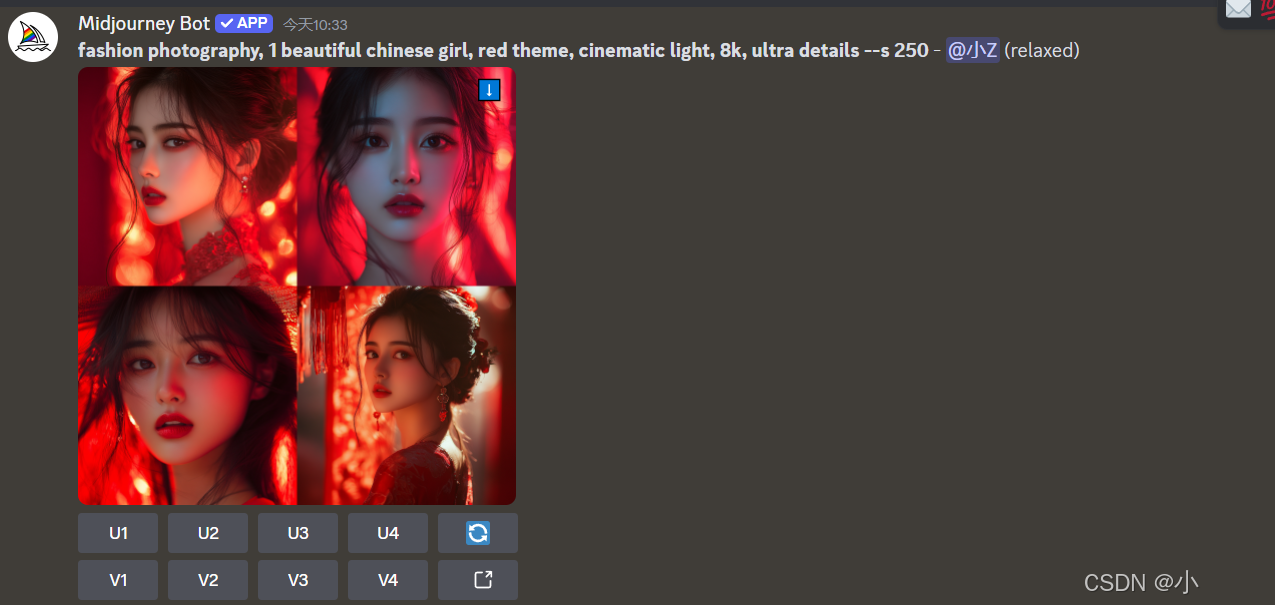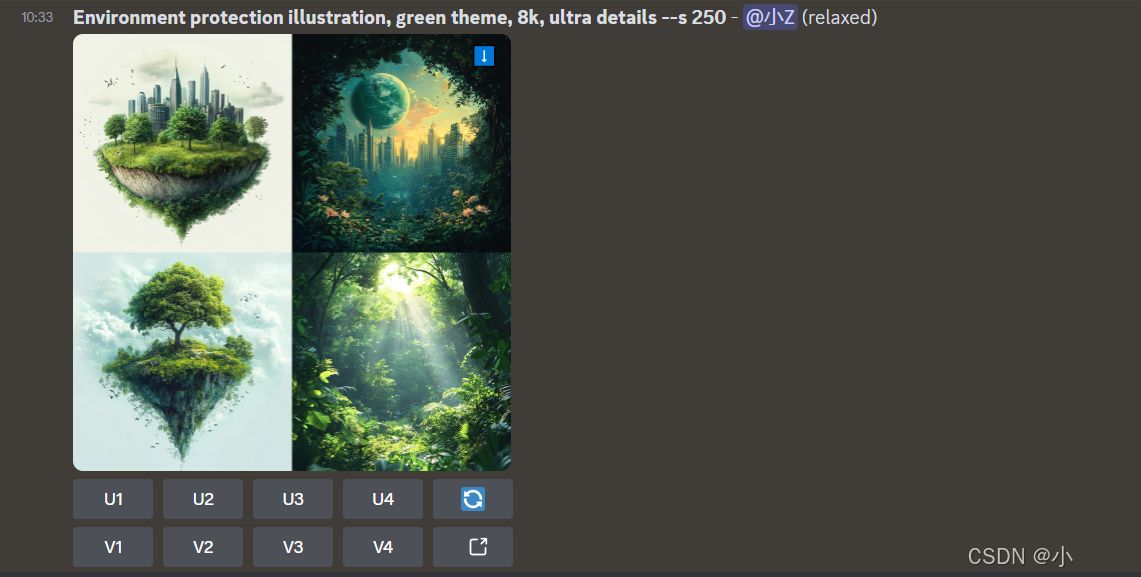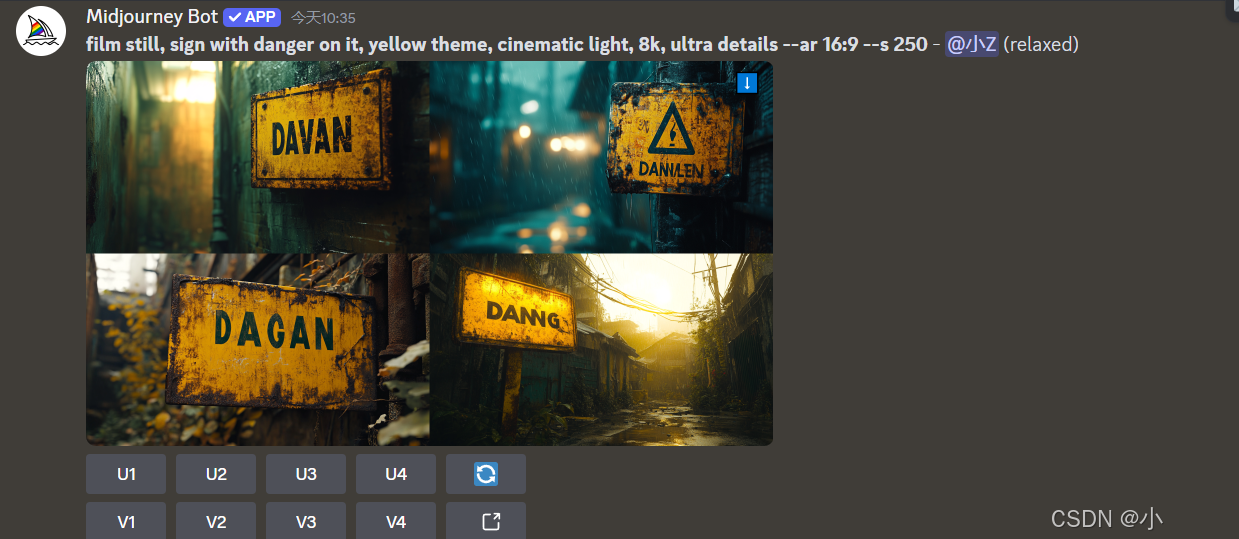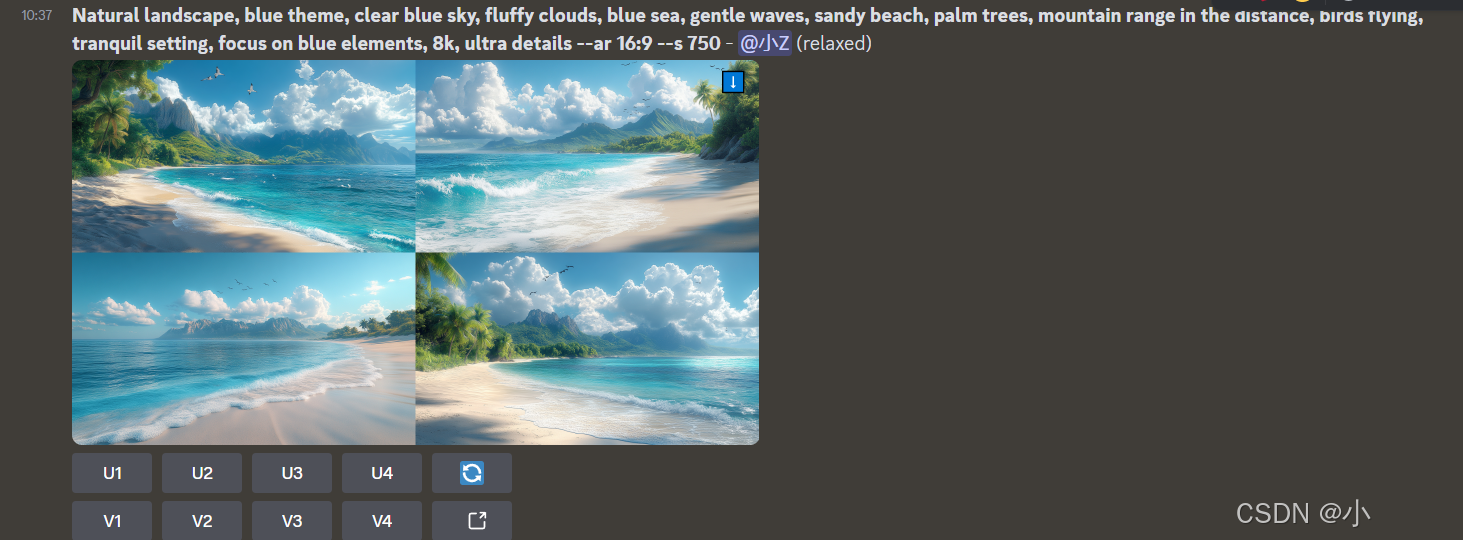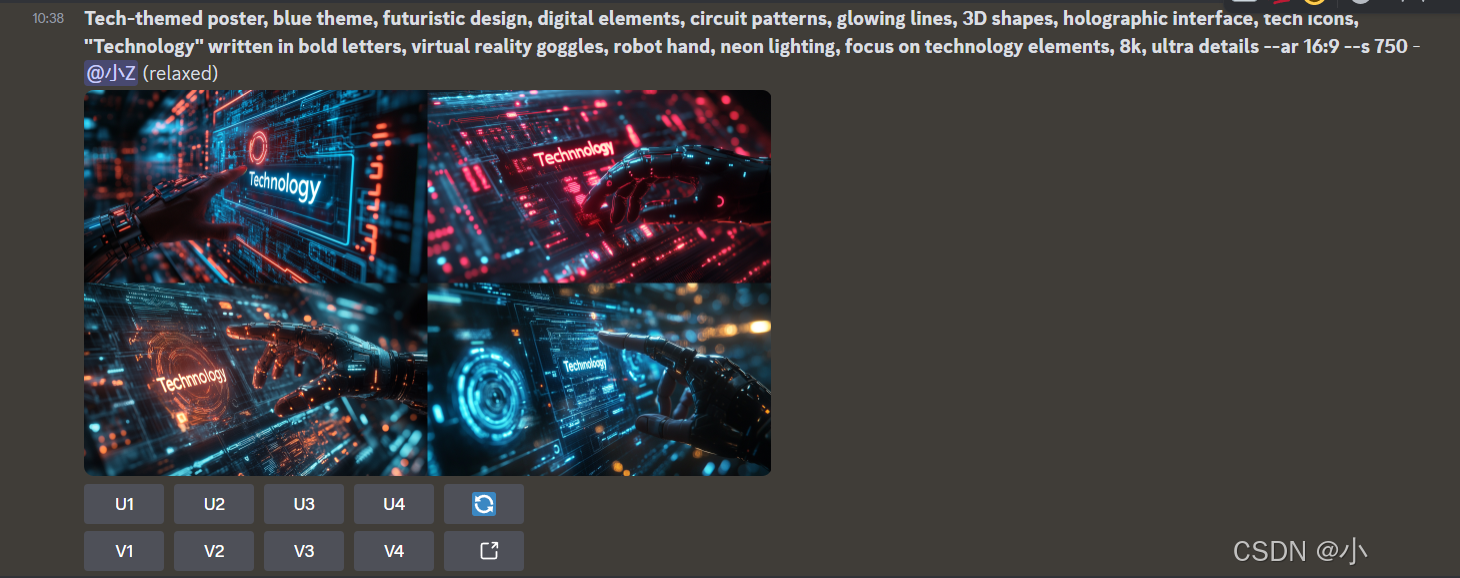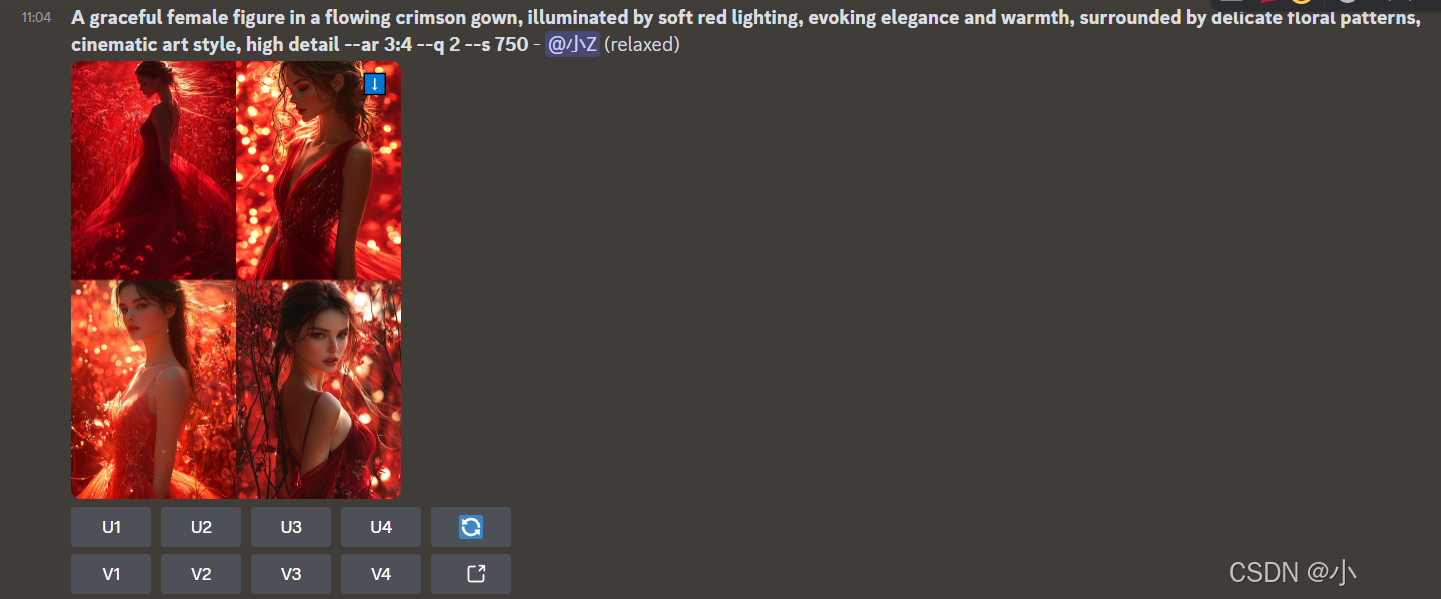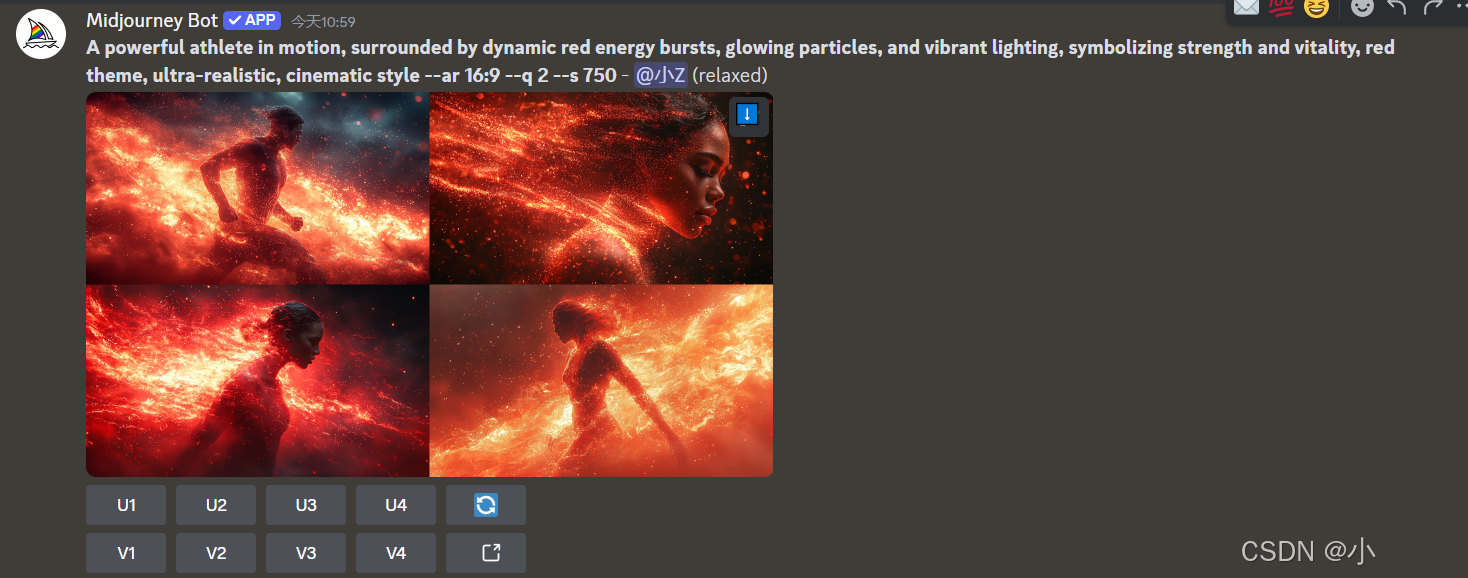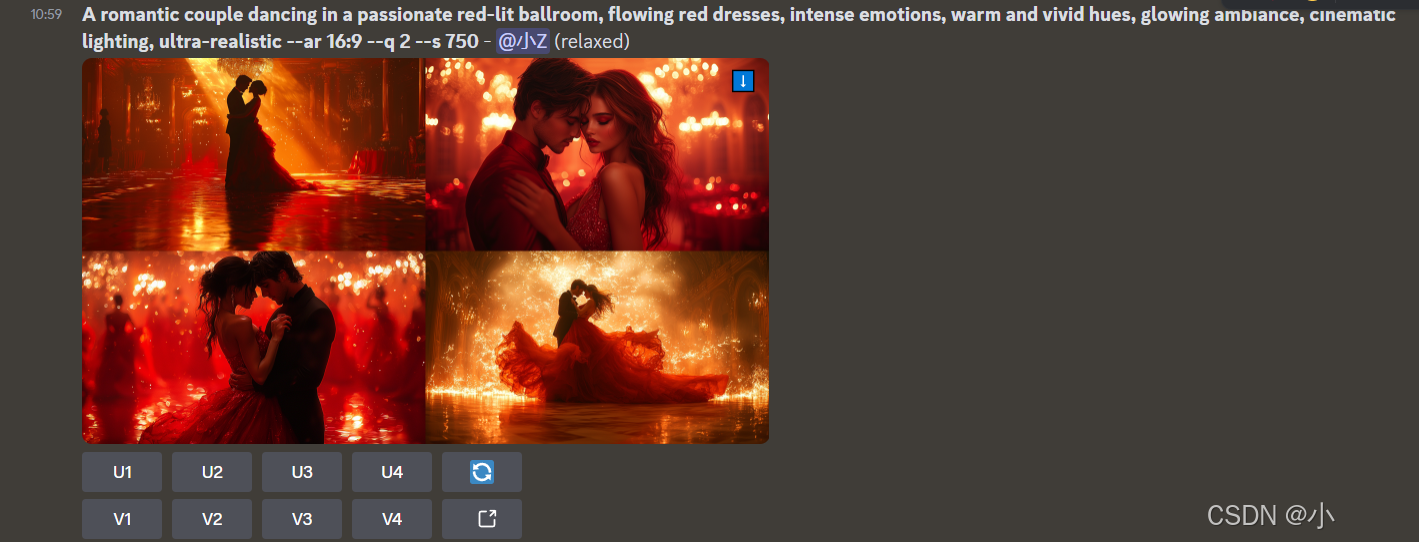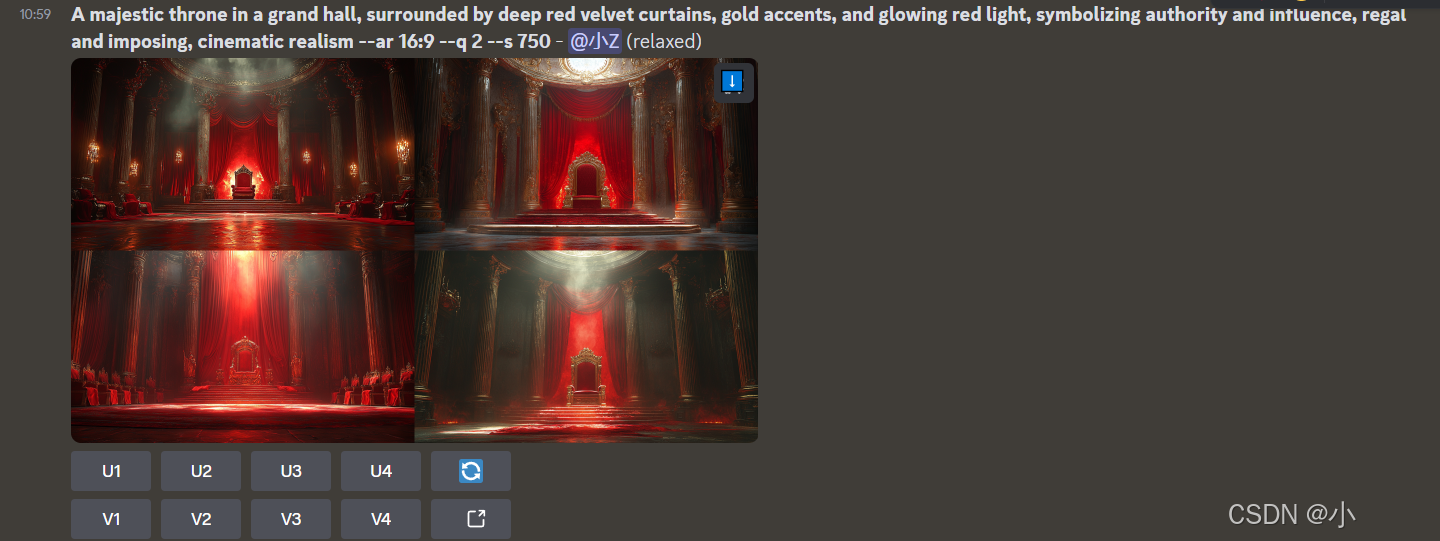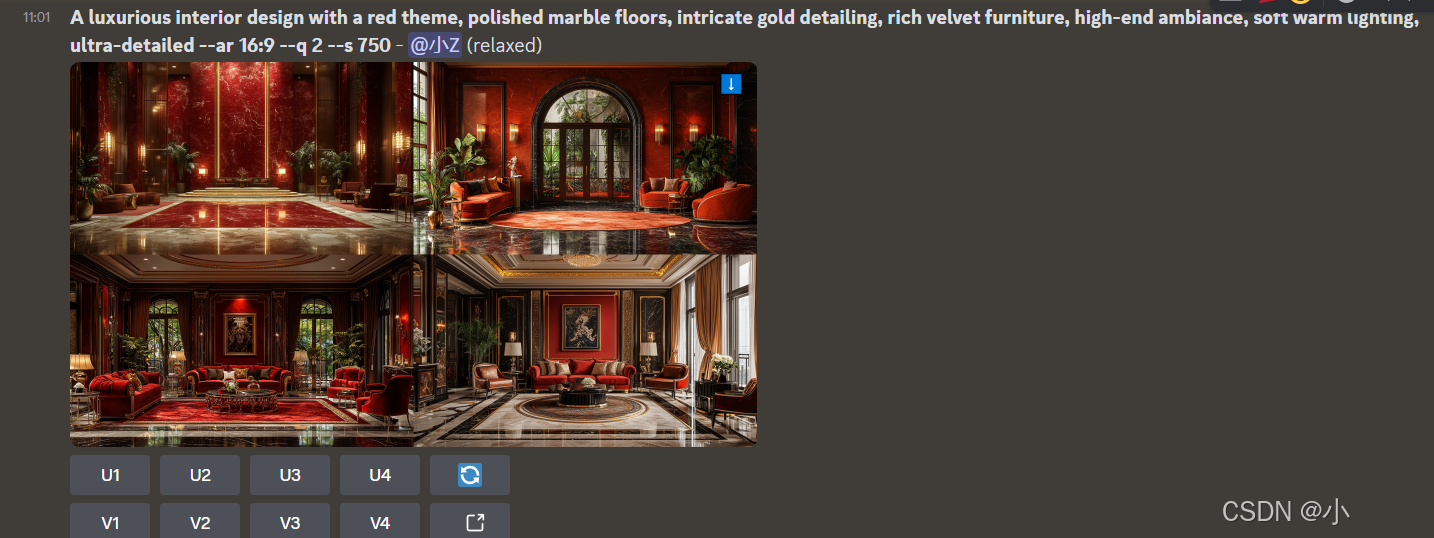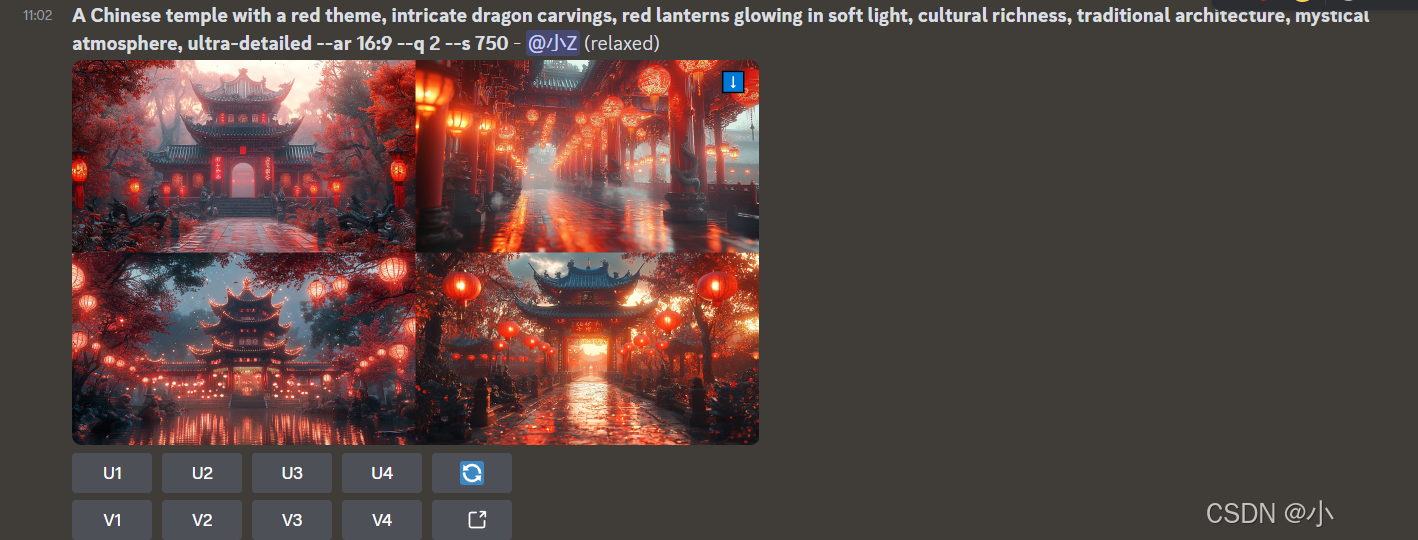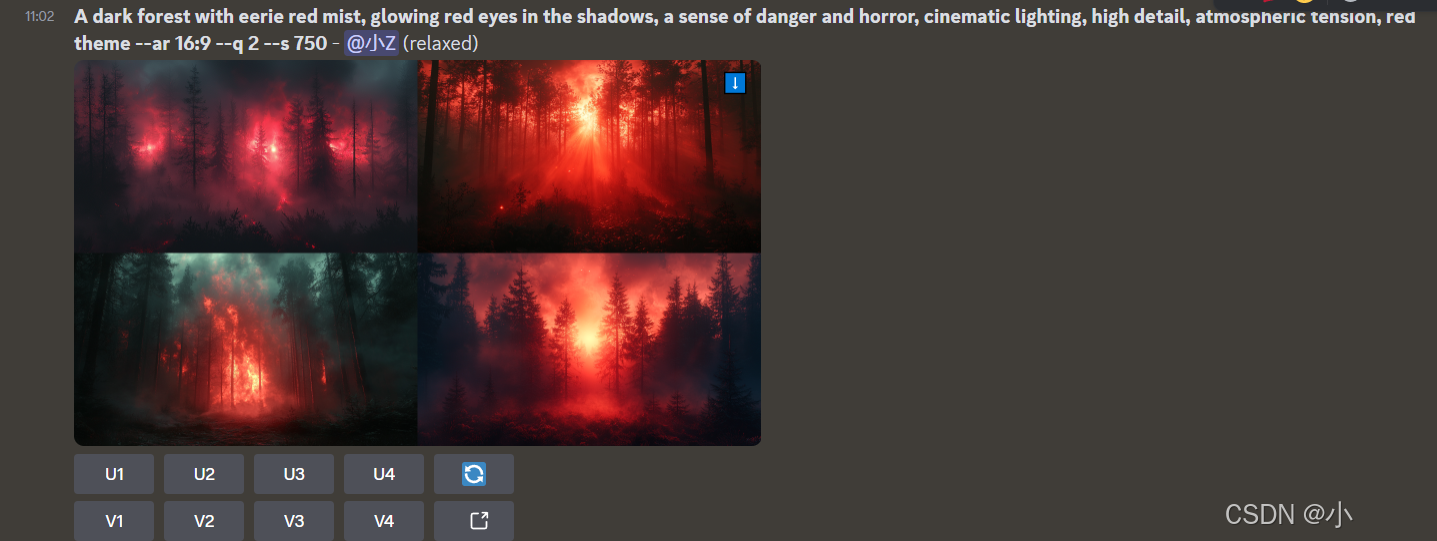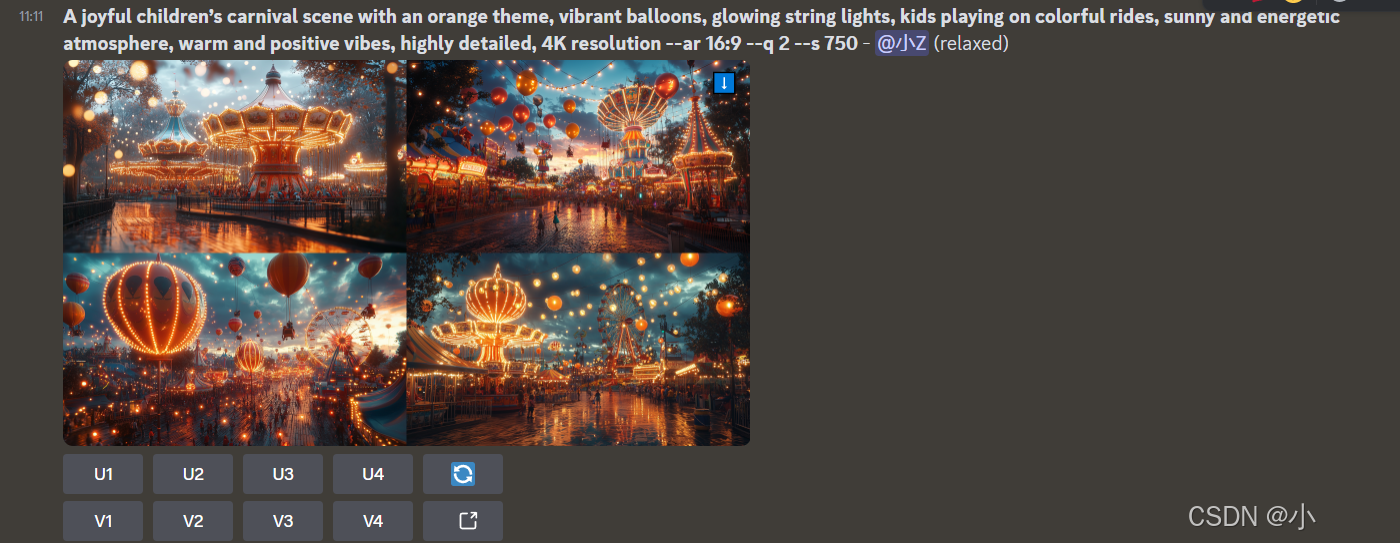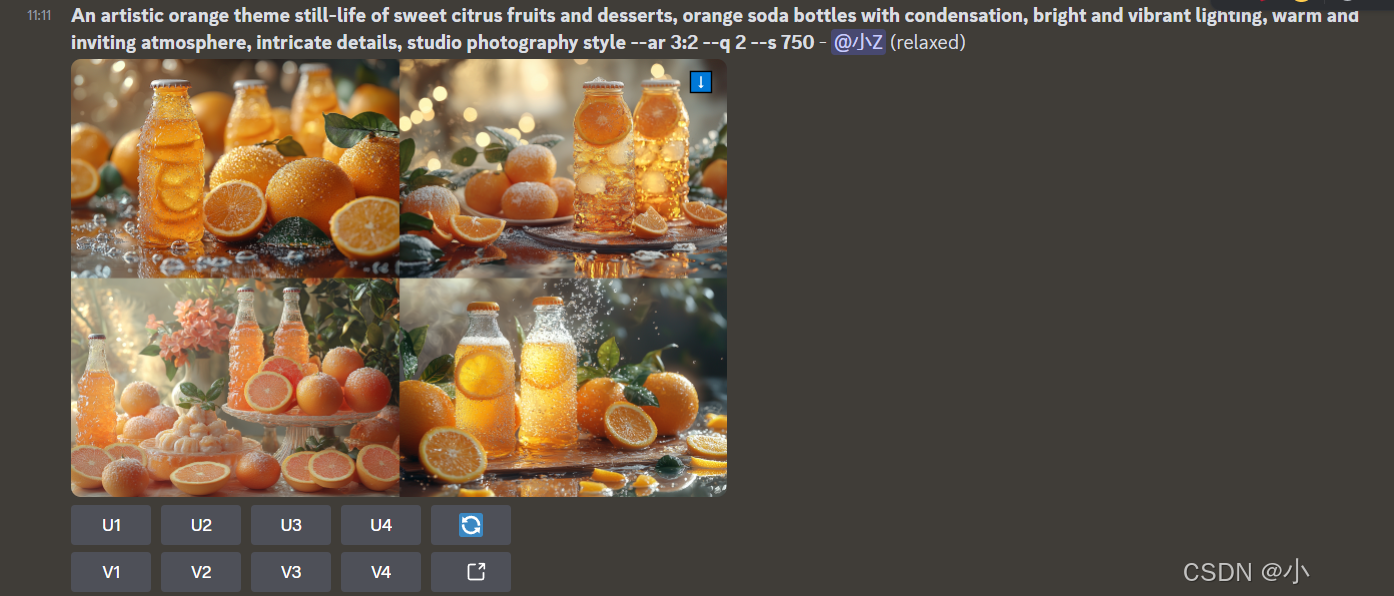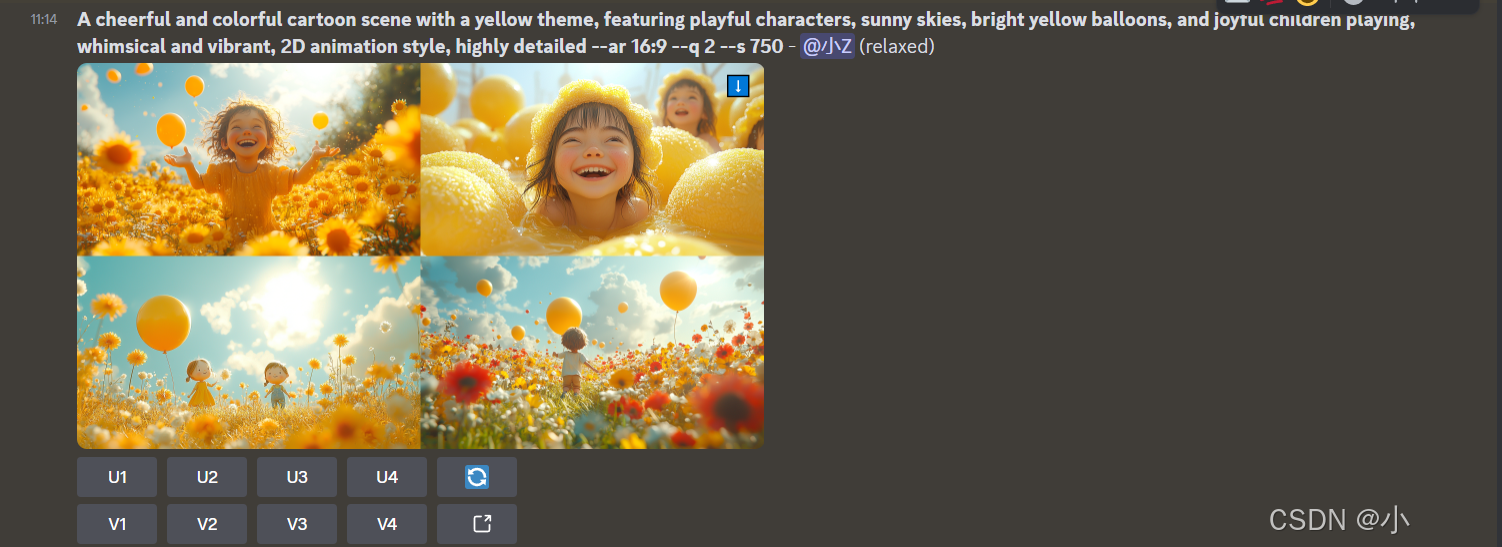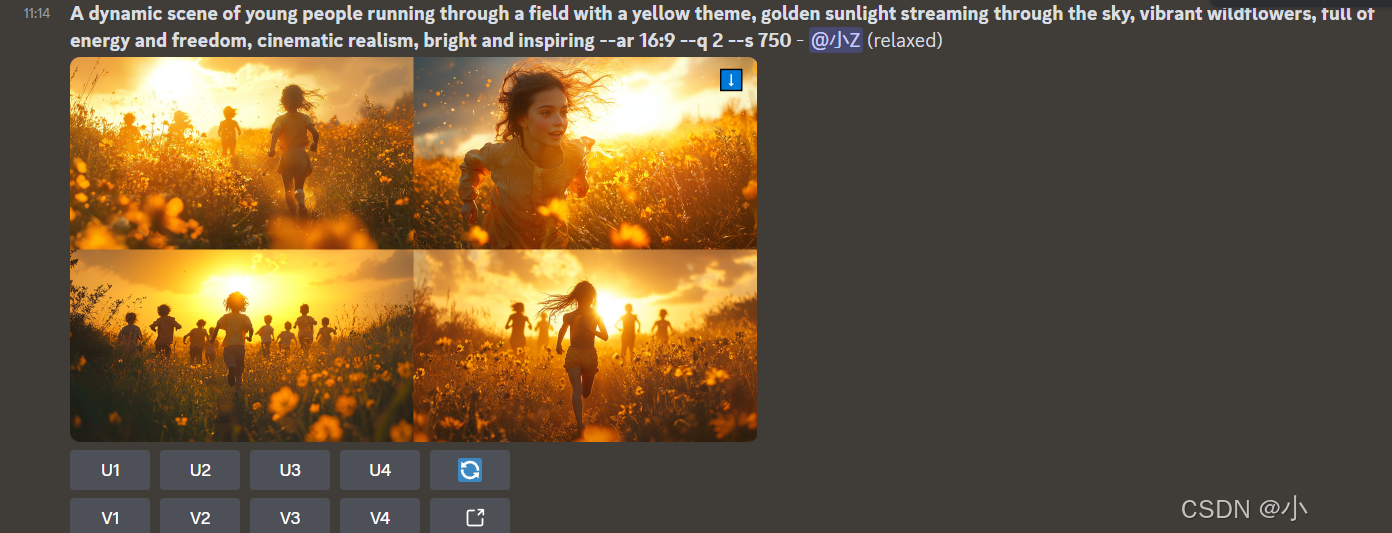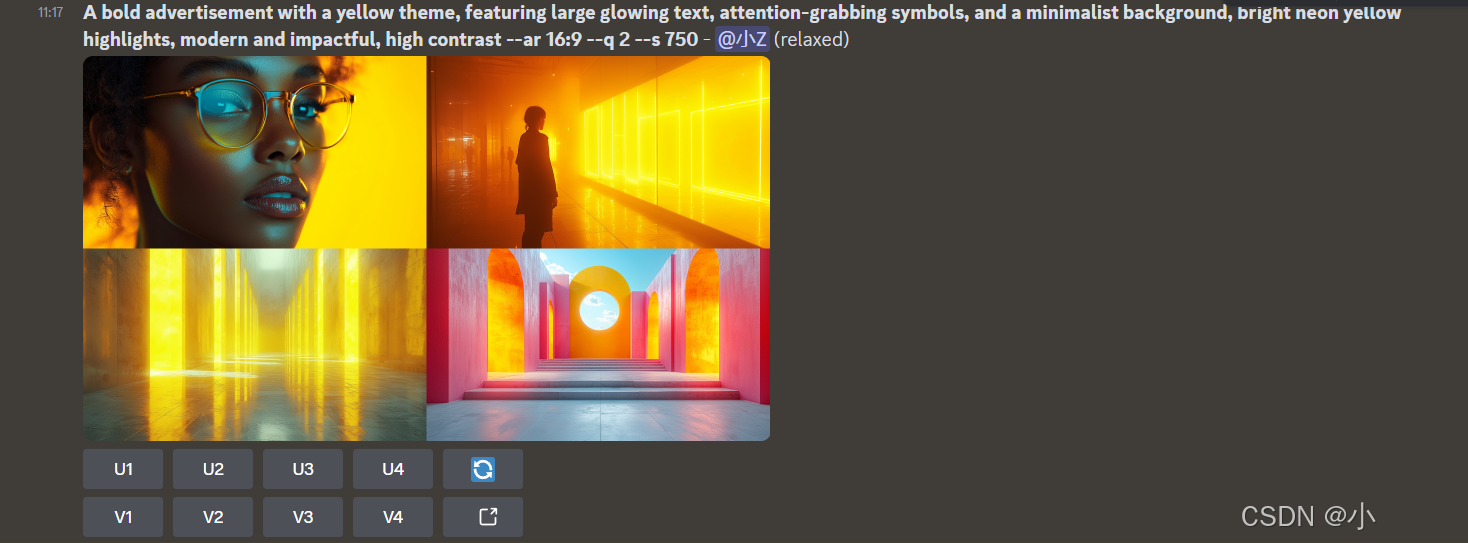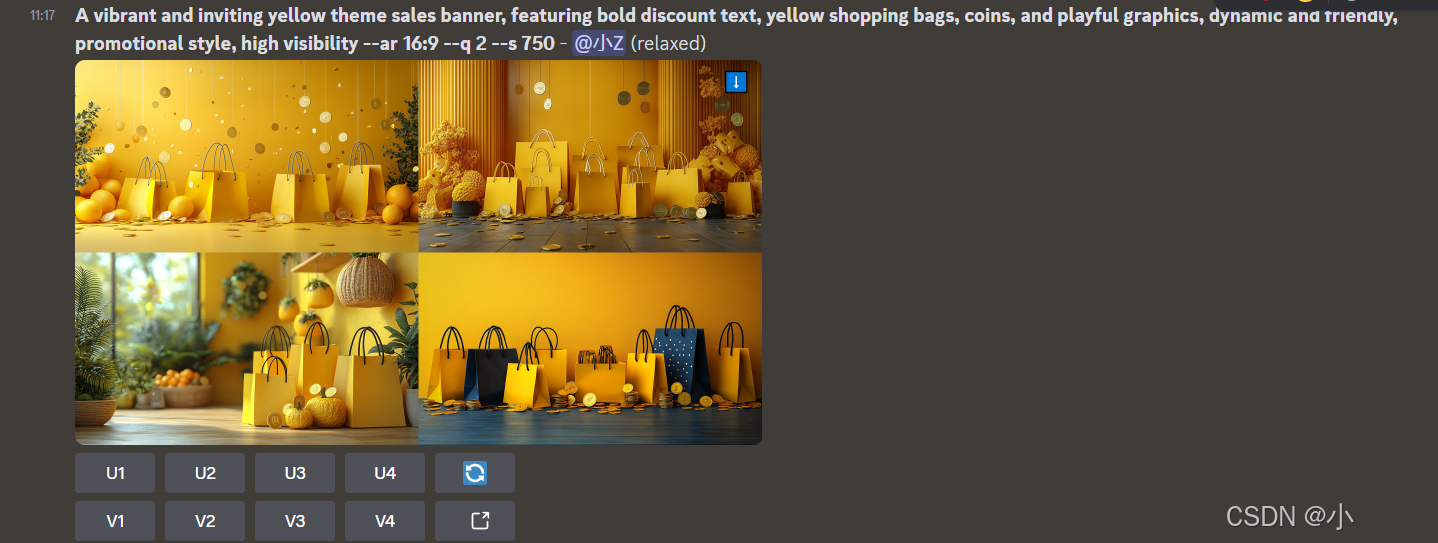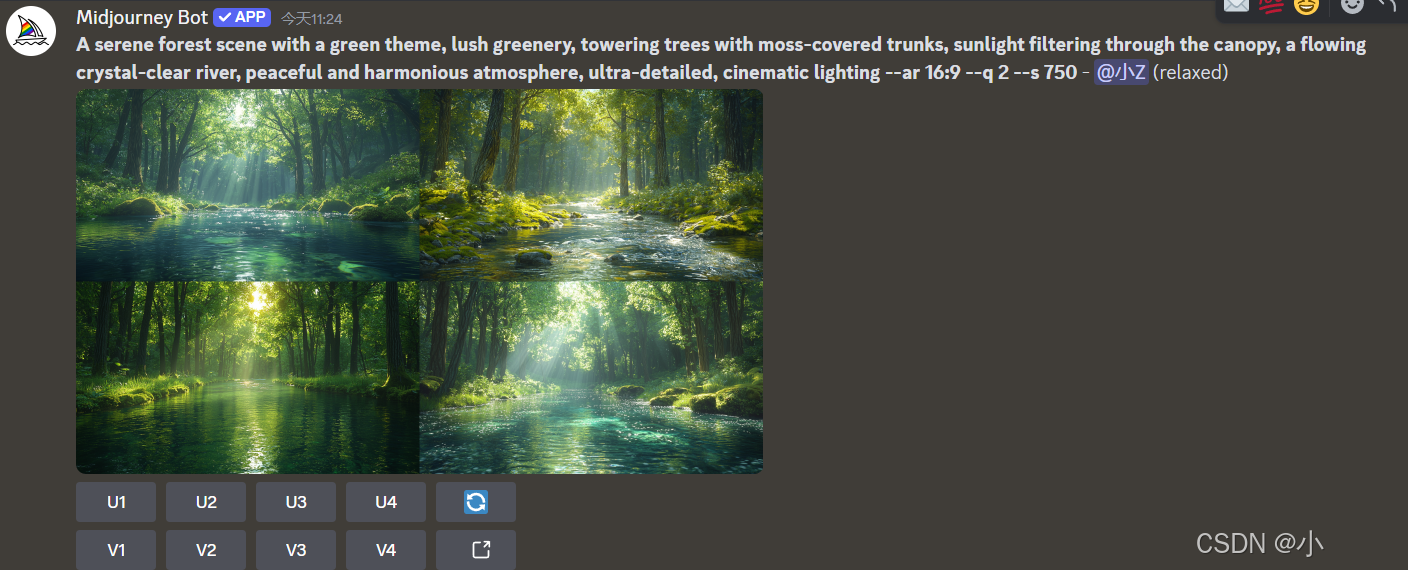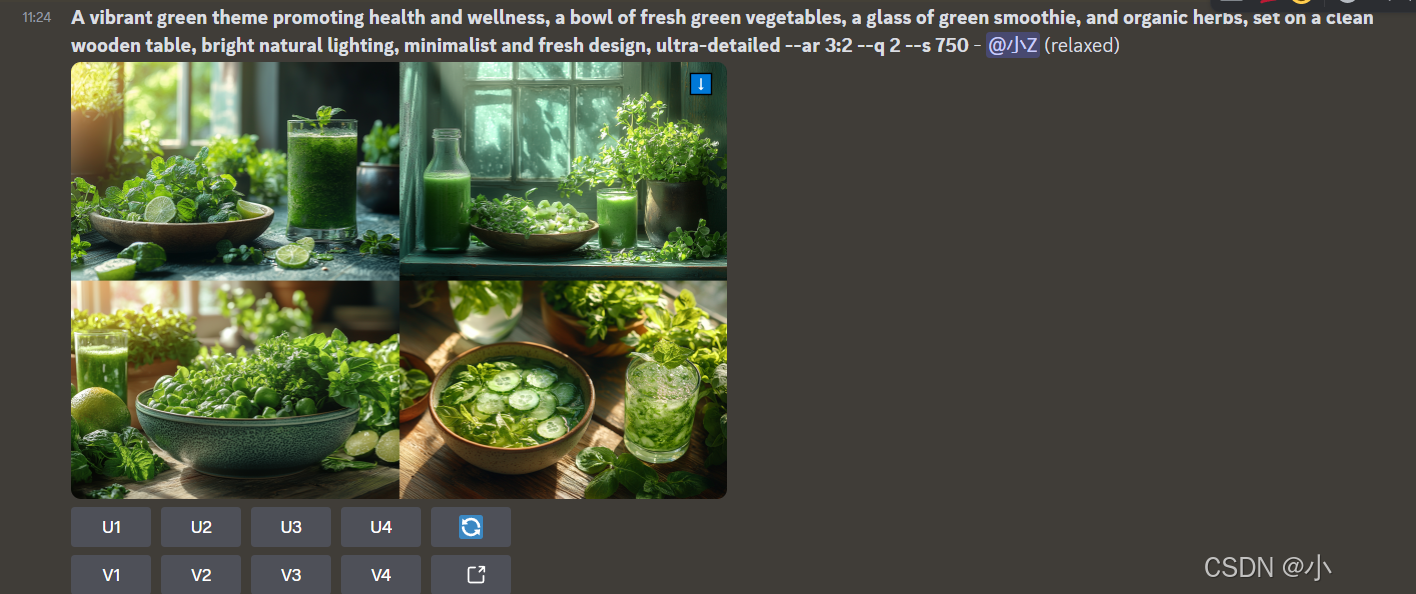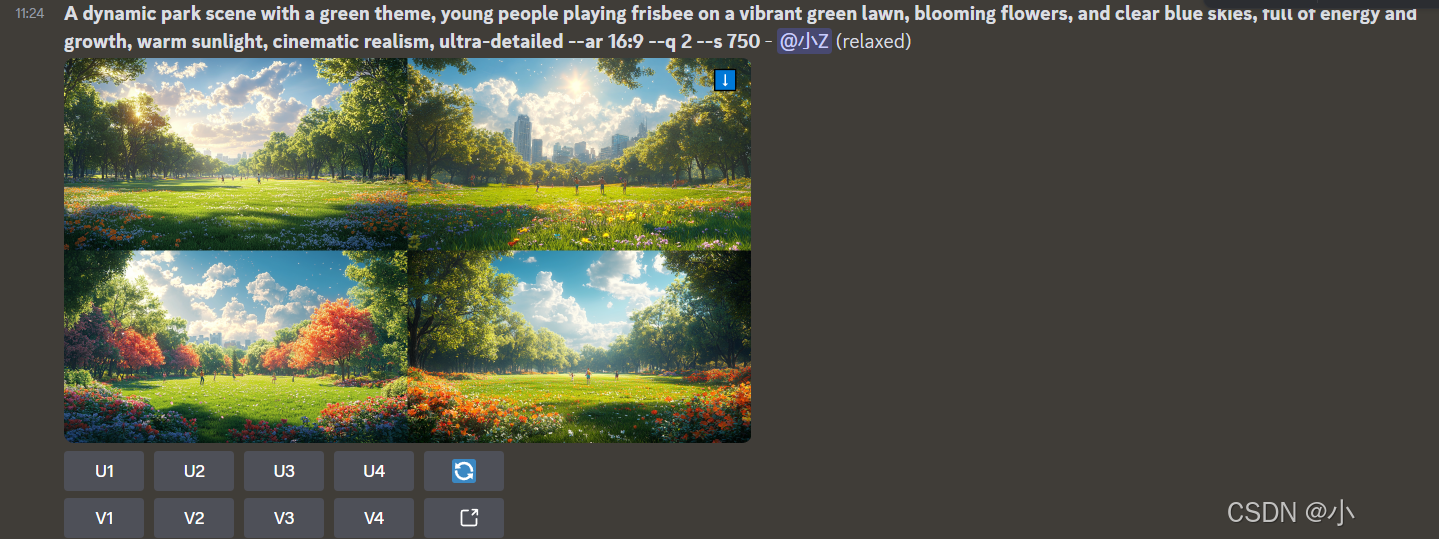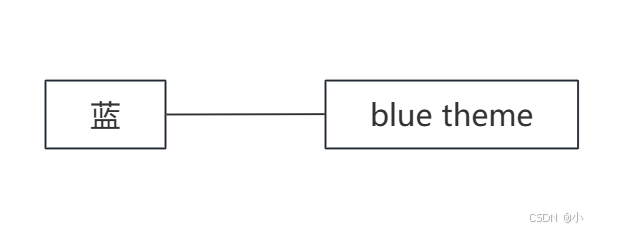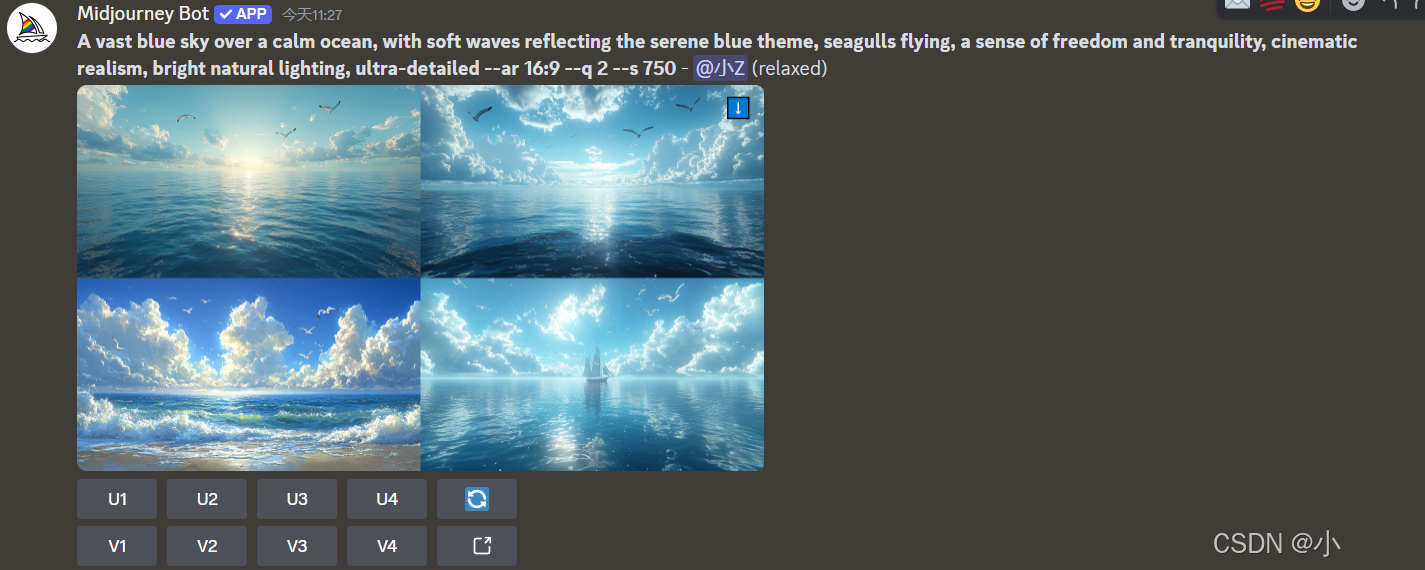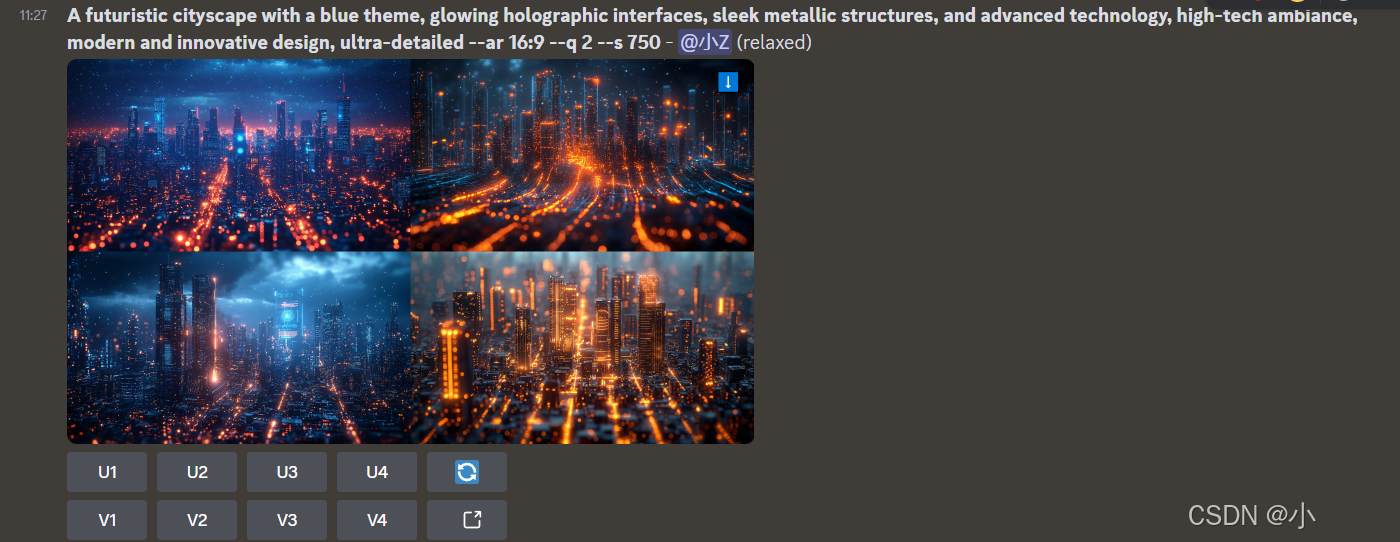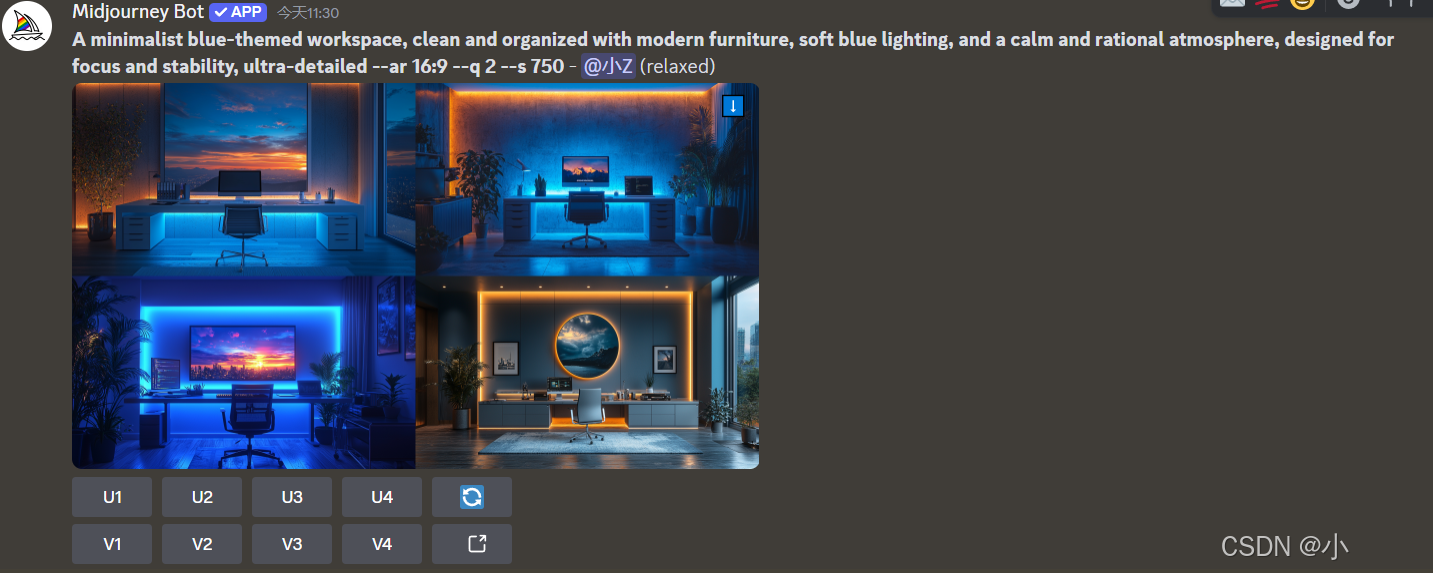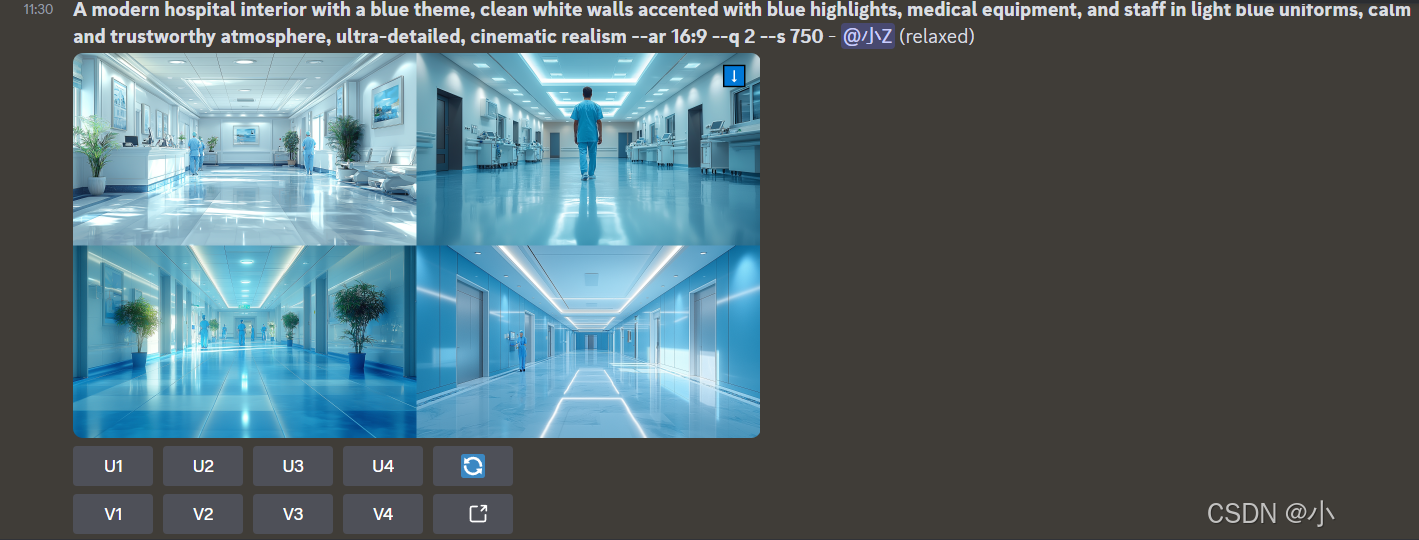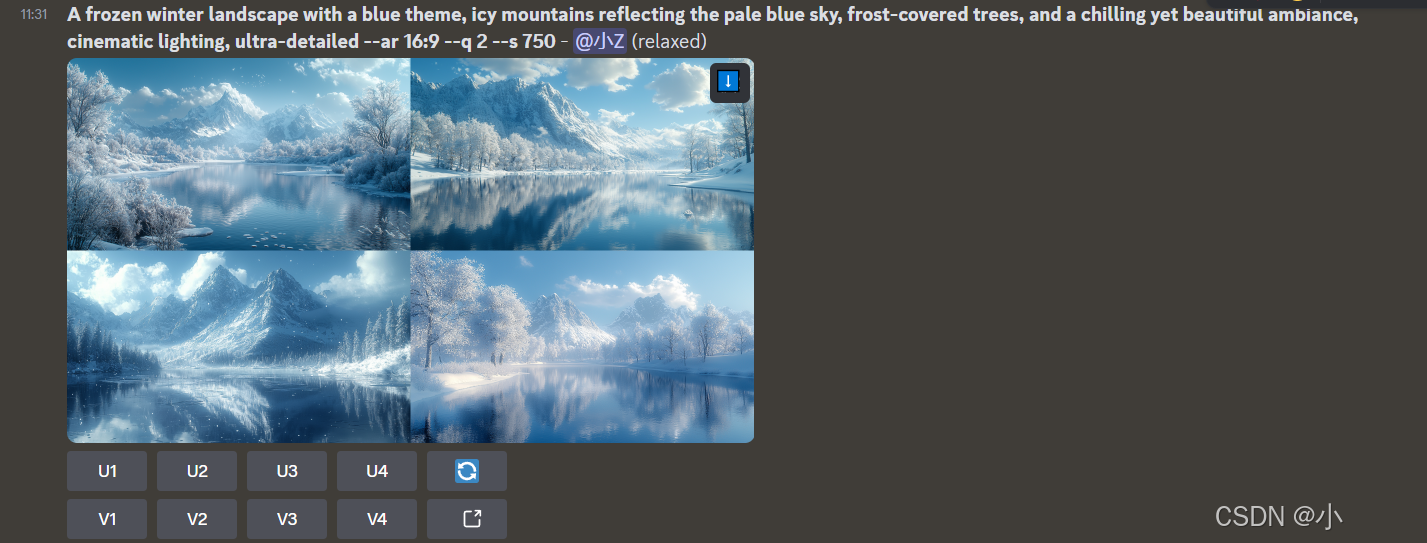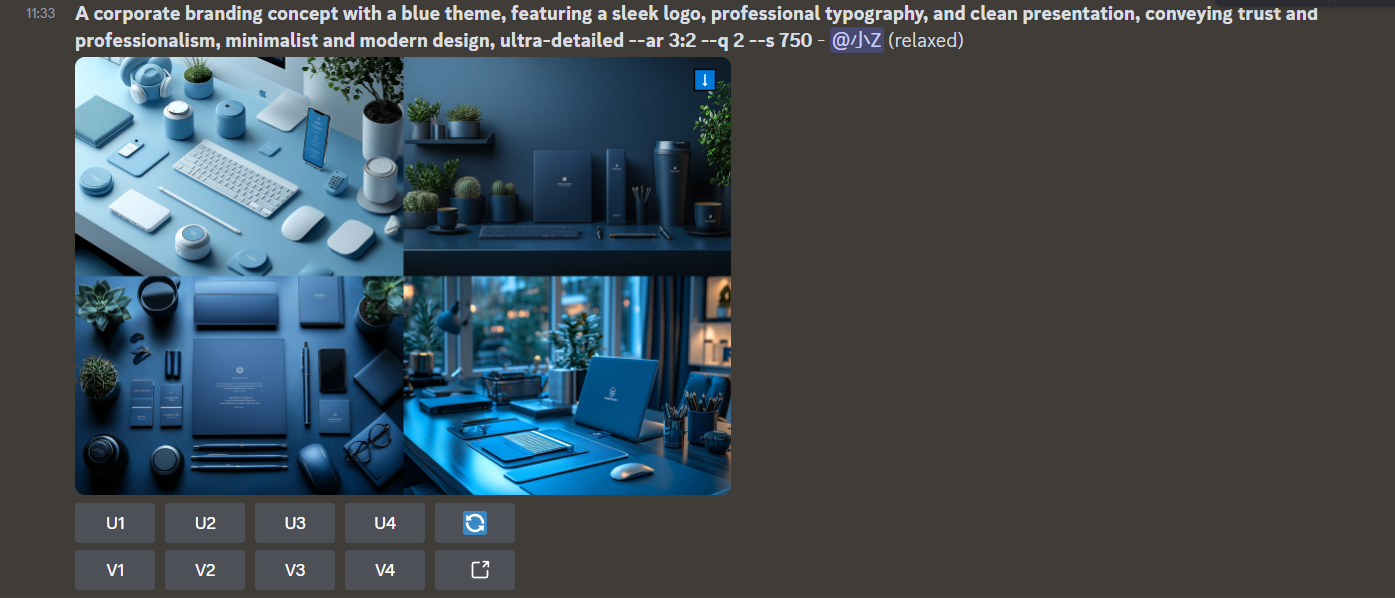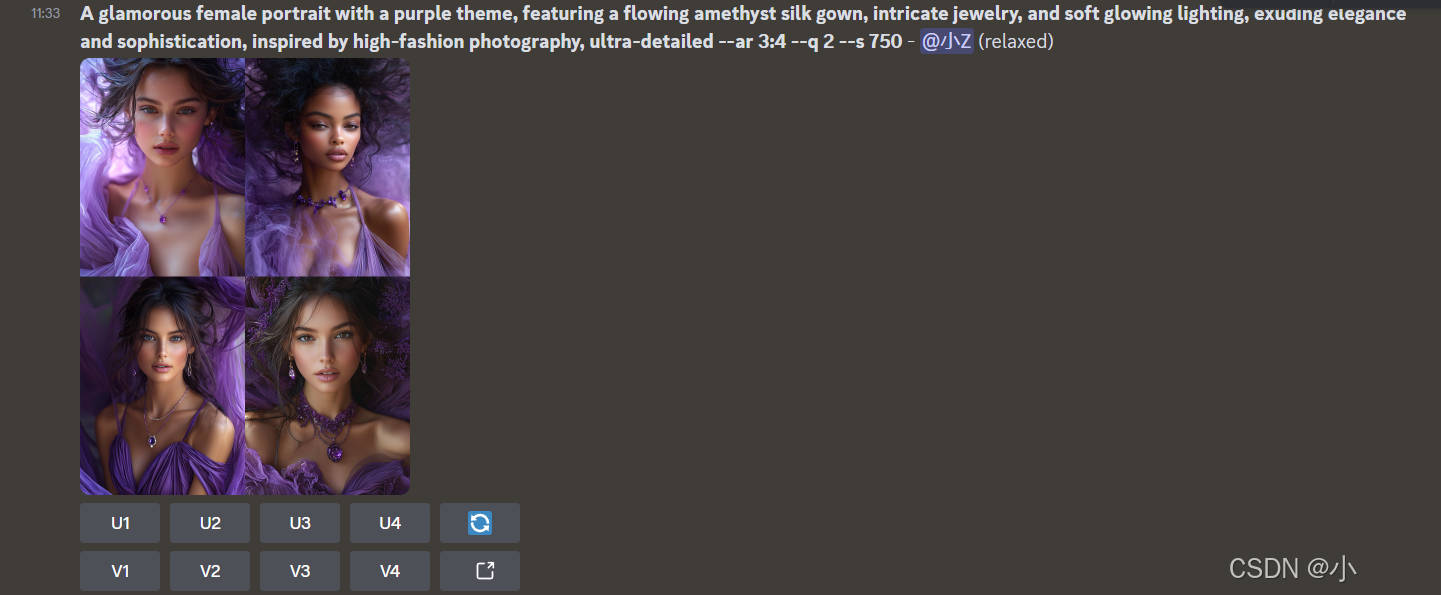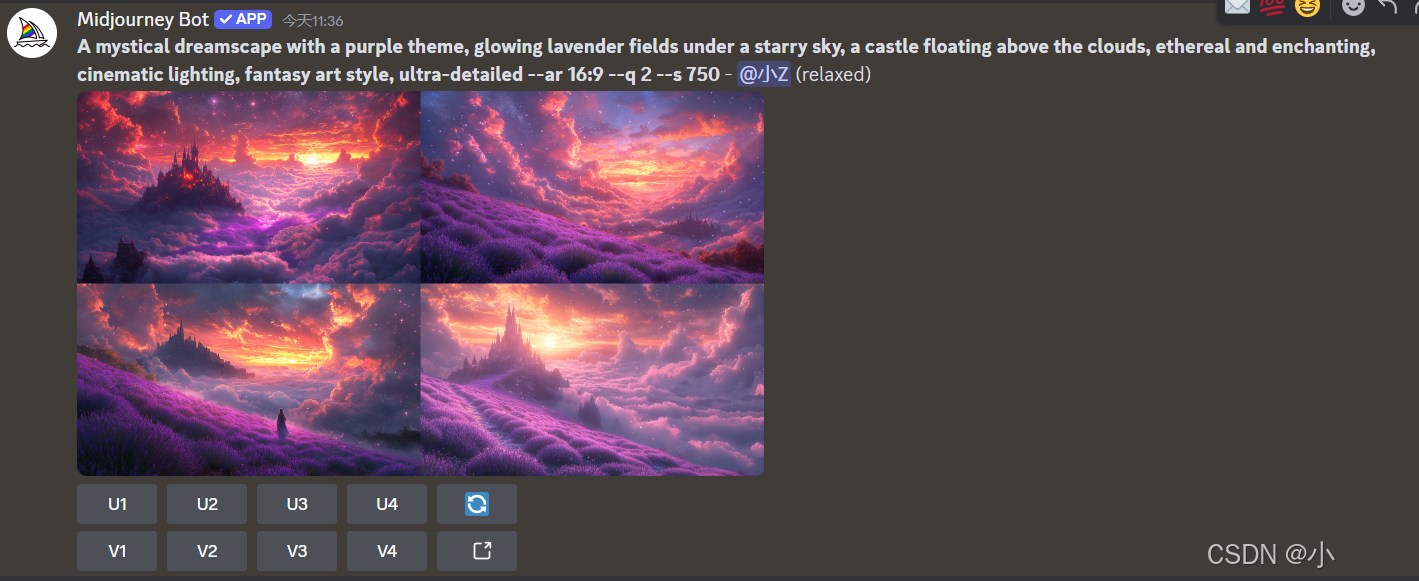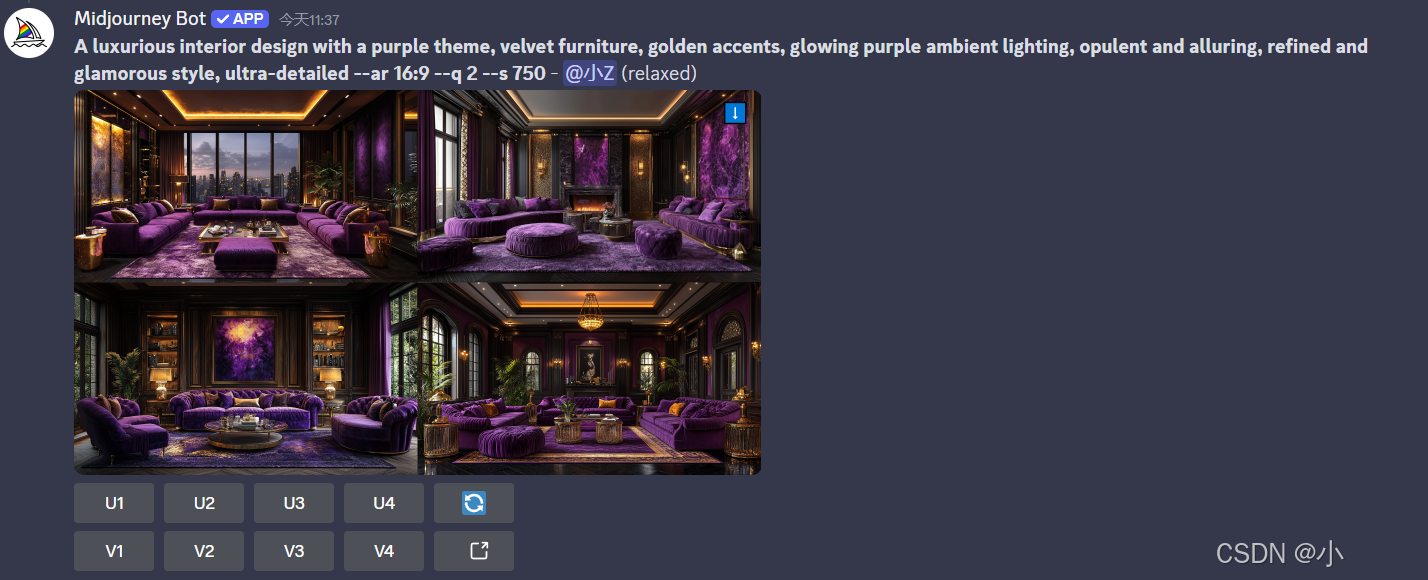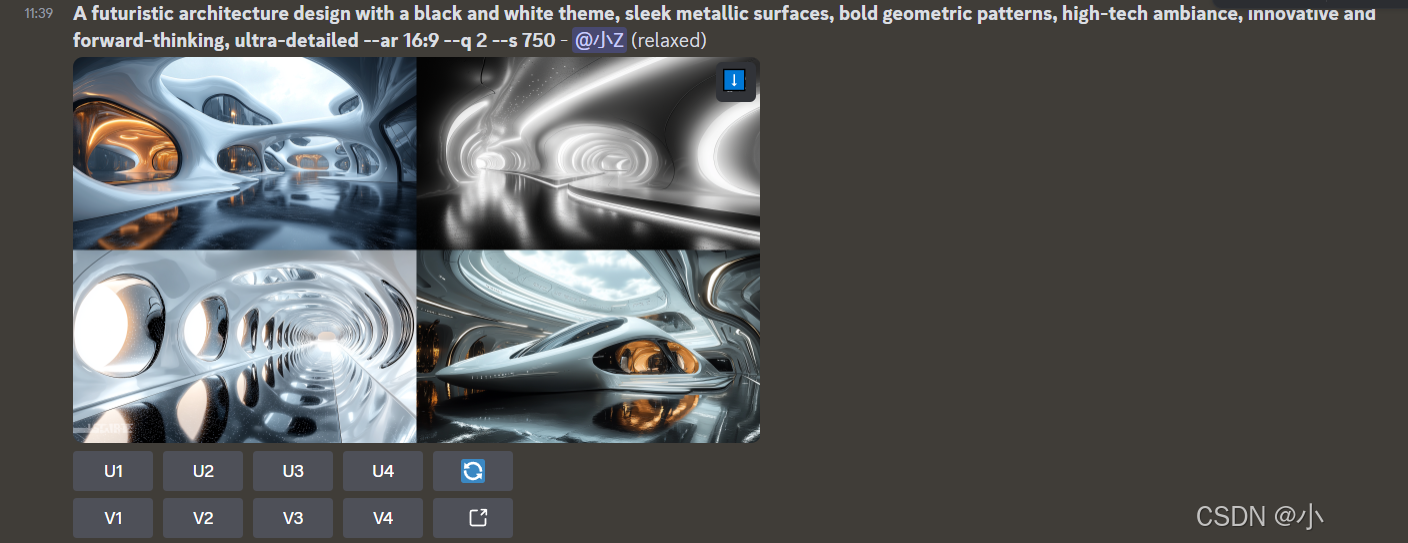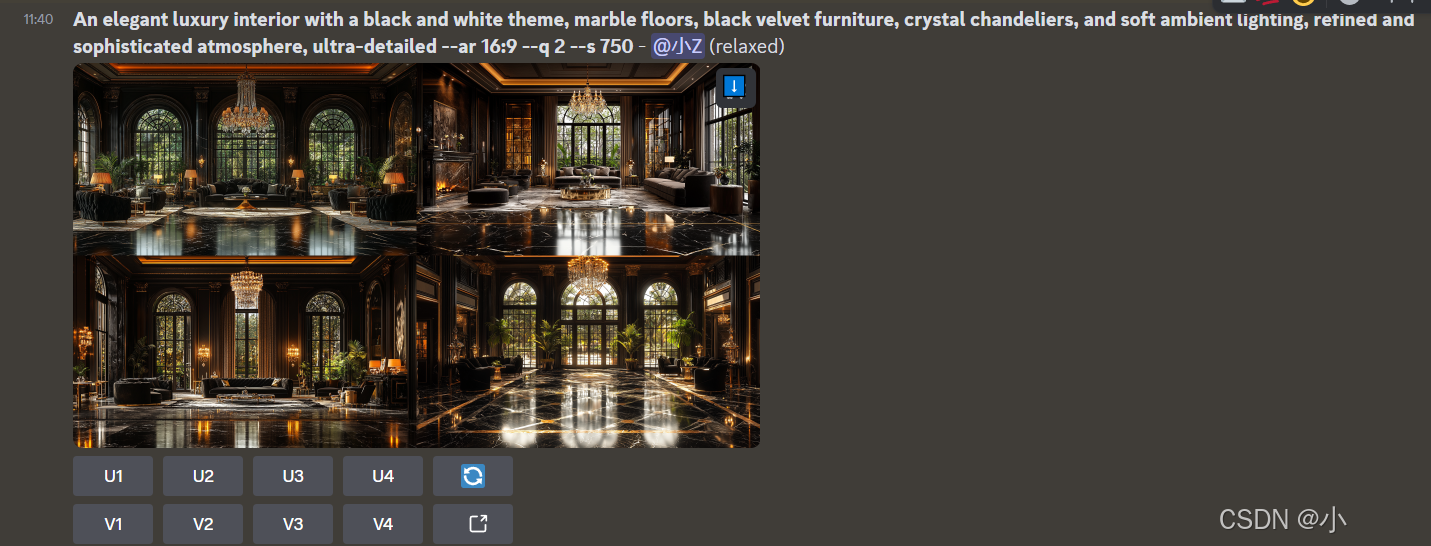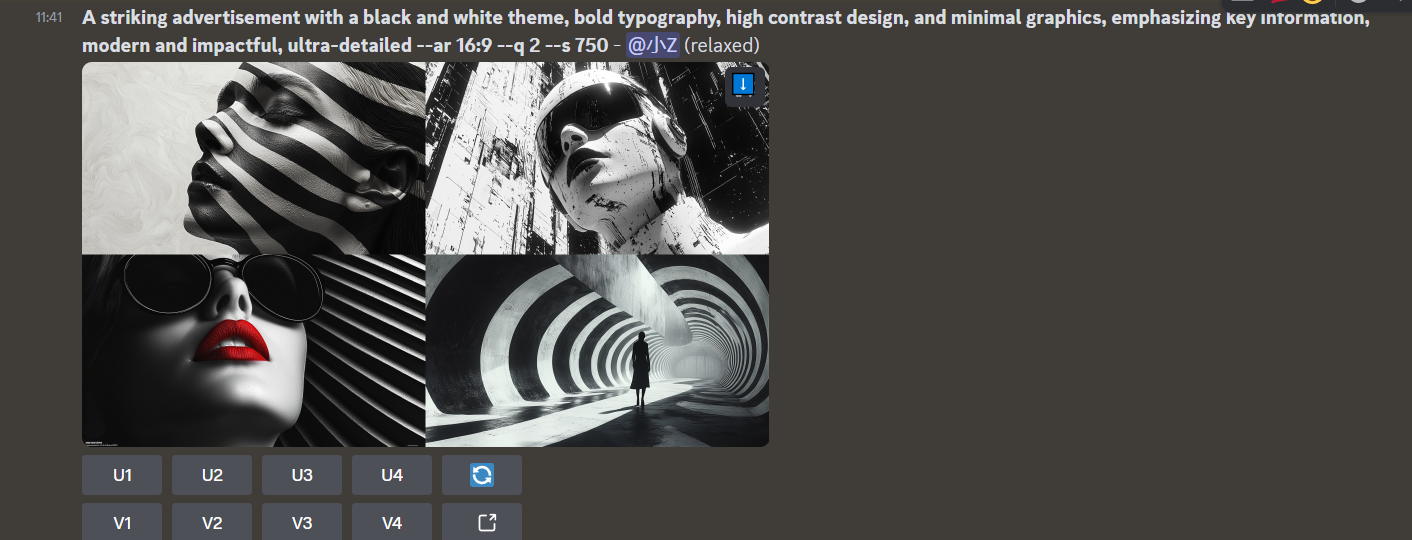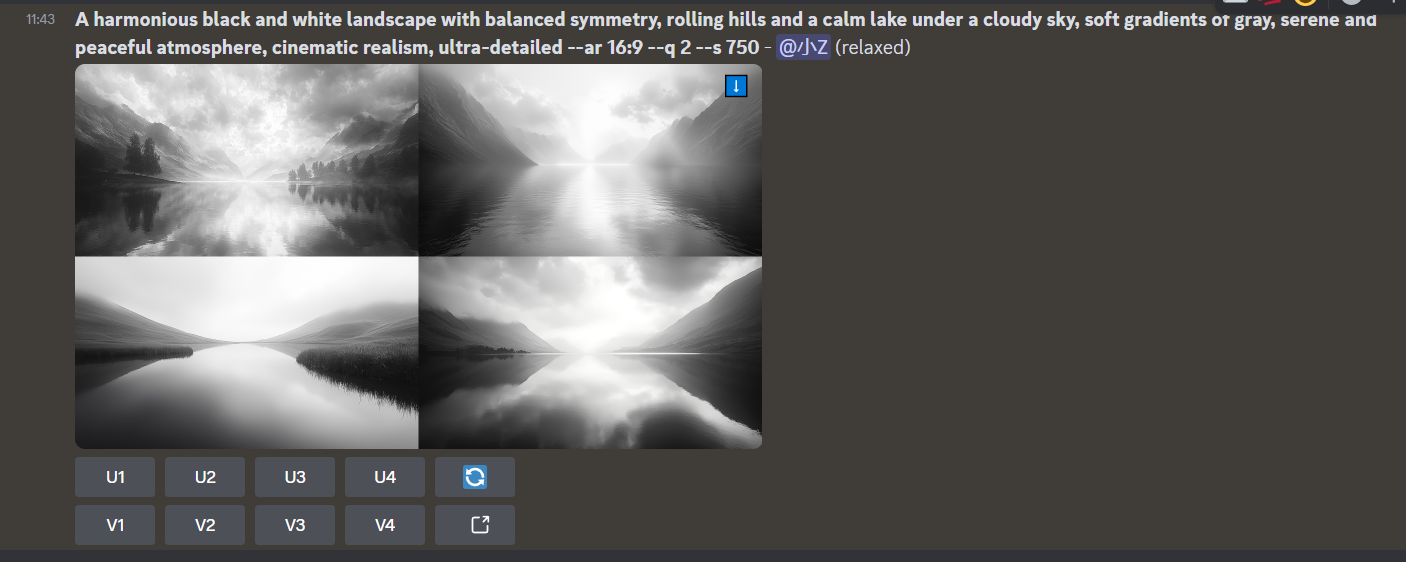💯前言
- 在设计领域中,色相作为色彩的重要维度,直接决定了作品的视觉基调与情感表达。通过对色相的深入理解与灵活运用,设计师可以在作品中精准传递信息,激发观众的情感共鸣。Midjourney 作为一款强大的AI绘画工具,为设计师提供了高效探索色相表现的创作平台,使复杂的色彩控制变得直观且富有创意。
本篇文章将以色相为核心,从色彩心理学与实际应用出发,结合 Midjourney 的提示词设置,详细解析不同色相在设计中的作用与特点。无论是自然主题的绿、蓝,还是富有情感张力的红、紫,每一种色相都在设计中扮演着不可替代的角色。
Midjourney官方使用手册
💯Midjourney中的色彩控制
- 在 Midjourney 中,色彩控制是设计过程中的一个重要环节。无论是为了增强视觉冲击力还是准确传达设计理念,合理的
色彩选择都能为设计增添情感和深度,帮助我们更好地传递信息,影响观众的情绪反应。still life, New Year Gift Box, red theme, cinematic light, 8k, ultra details
为什么要控制色彩?
- 控制色彩的本质是为了更精准地影响情感,准确传达我们想要表达的信息。色彩设计不仅仅是选择一种
视觉上的搭配,更是影响人们心理感受的关键因素。fashion photography, 1 beautiful chinese girl, red theme, cinematic light, 8k, ultra details
- 在设计中,色彩常常被称作无声的催眠。合理的色彩搭配可以让设计语言更加有力地表达,增强其对
受众的吸引力。Environment protection illustration, green theme, 8k, ultra details
- 如果在设计中没有选对合适的配色,那么可能不仅无法准确地传达设计目的,甚至可能与
原意背道而驰,让整体设计的美感和意义大打折扣。film still, sign with danger on it, yellow theme, cinematic light, 8k, ultra details --ar 16:9
为什么要在Midjourney中控制色彩?
-
在 Midjourney 中,系统通常会根据主题自动进行配色,尤其是在一些灵感探索类的设计中,自动配色常常可以带来不错的结果。
这种自动配色的优点是,可以帮助设计者节省配色上的精力,减少因为色彩搭配不当而带来的问题。然而,这种自动化的配色也有一定的不足:- 它的缺点在于,可能会掩盖设计中的不足之处。
- 一旦出现
配色问题,自动配色也无法提供有效的提示,从而使设计者难以发现问题所在。
Qingming Festival poster, green theme, illustrations of traditional Chinese activities like tomb sweeping, kite flying, willow branches, food offerings, family figures paying respects, spring landscape, vivid blue sky --ar 3:4
-
在实际的设计场景中,我们往往会有更具体的配色需求。例如:
- 有时是客户对某种颜色有明确的要求;
- 或者在概念和创意阶段已经确定了特定的
颜色方案; - 亦或是设计中的某些元素必须使用特定颜色。
在这些情况下,设计师需要精确地控制色彩,而不是完全依赖自动配色来完成整个设计。
Natural landscape, blue theme, clear blue sky, fluffy clouds, blue sea, gentle waves, sandy beach, palm trees, mountain range in the distance, birds flying, tranquil setting, focus on blue elements, 8k, ultra details --ar 16:9
- 通过 Midjourney 中的配色控制,我们能够把握设计中每一个元素的色彩,使其与整体的
设计理念相一致,达到理想的设计效果。
总的来说,在 Midjourney 中控制色彩,既可以在灵活运用系统自动配色的优点中得以解放,又可以在特定的需求下实现更加专业和精细的控制。这样的配色方法可以帮助我们实现更加优秀的设计成果。Tech-themed poster, blue theme, futuristic design, digital elements, circuit patterns, glowing lines, 3D shapes, holographic interface, tech icons, "Technology" written in bold letters, virtual reality goggles, robot hand, neon lighting, focus on technology elements, 8k, ultra details --ar 16:9
💯色相
- 在设计领域中,色相是色彩的重要组成部分,决定了视觉感受和情感共鸣的传达方式。通过使用色相来定义设计中的
配色主题,我们可以有效地激发目标受众的情绪反应,使设计内容更具吸引力。
提示词写作方法:<color> theme
红
提示词: red theme
色彩心理学:
红色通常与强烈的情绪和象征性内涵相关,是一种具有深厚心理影响的色相。它能够唤起多种情感反应,因而在设计中使用得当可以产生显著的效果:
- 性感/女性: 红色常用于传达女性化的特质和
性感的氛围,尤其在时尚和美容行业中,红色是最常见的代表色。A graceful female figure in a flowing crimson gown, illuminated by soft red lighting, evoking elegance and warmth, surrounded by delicate floral patterns, cinematic art style, high detail --ar 3:4 --q 2
- 力量/能量: 红色也被用来传达力量与活力,具有提升士气和
吸引注意力的功能,因此在运动、健身领域得以广泛应用。A powerful athlete in motion, surrounded by dynamic red energy bursts, glowing particles, and vibrant lighting, symbolizing strength and vitality, red theme, ultra-realistic, cinematic style --ar 16:9 --q 2
- 热情: 红色能让人联想到热情洋溢的情感,象征着对事物的激烈追求和深刻的感情。
A romantic couple dancing in a passionate red-lit ballroom, flowing red dresses, intense emotions, warm and vivid hues, glowing ambiance, cinematic lighting, ultra-realistic --ar 16:9 --q 2
- 权力: 红色象征着权力和影响力,许多重要的
标志或徽章使用红色,以此代表庄严和高贵。A majestic throne in a grand hall, surrounded by deep red velvet curtains, gold accents, and glowing red light, symbolizing authority and influence, regal and imposing, cinematic realism --ar 16:9 --q 2
- 高端/奢华: 红色也能传达奢华感,尤其是在珠宝和高端产品的设计中,红色可以彰显高贵的品质。
A luxurious interior design with a red theme, polished marble floors, intricate gold detailing, rich velvet furniture, high-end ambiance, soft warm lighting, ultra-detailed --ar 16:9 --q 2
- 文化/历史/艺术: 红色在不同文化中常有特定的
象征意义,如中国文化中的==“吉祥”和西方文化中的“爱情”==。A Chinese temple with a red theme, intricate dragon carvings, red lanterns glowing in soft light, cultural richness, traditional architecture, mystical atmosphere, ultra-detailed --ar 16:9
- 危险/恐怖: 红色也象征着危险和恐惧,这种属性常用于警示标志或
恐怖题材的设计中。A dark forest with eerie red mist, glowing red eyes in the shadows, a sense of danger and horror, cinematic lighting, high detail, atmospheric tension, red theme --ar 16:9 --q 2
橙
提示词: orange theme
色彩心理学:
橙色是一个富有活力和友好感的色相,通常与快乐和温暖的情感相联系。在设计中,橙色常被用来激发积极的情绪:
- 秋天/丰收: 橙色象征秋天和丰收的景象,因此在与
季节相关的设计中,橙色常用来传达丰收的氛围。A serene autumn landscape with an orange theme, golden fields of wheat under a warm orange sunset, scattered fallen leaves, pumpkins and harvest baskets, peaceful and vibrant atmosphere, ultra-detailed, cinematic lighting --ar 16:9 --q 2
- 食品/饮料/甜味: 橙色会让人联想到食品和饮料,尤其是甜味的水果或
零食,这使它成为食品包装设计中的常见选择。A joyful children’s carnival scene with an orange theme, vibrant balloons, glowing string lights, kids playing on colorful rides, sunny and energetic atmosphere, warm and positive vibes, highly detailed, 4K resolution --ar 16:9 --q 2
- 能量/快乐/幸福: 橙色传递着快乐和幸福的情绪,它能够激发活力,唤起人们心中积极的一面。橙色常用于儿童产品或与
娱乐活动相关的设计。An artistic orange theme still-life of sweet citrus fruits and desserts, orange soda bottles with condensation, bright and vibrant lighting, warm and inviting atmosphere, intricate details, studio photography style --ar 3:2 --q 2
黄
提示词: yellow theme
色彩心理学:
黄色是一种充满活力与光明感的色相,它能激发快乐和积极的情绪。它的应用常常用于强调和提示目的,具有吸引眼球的效果:
- 卡通/儿童: 黄色明亮且欢快,常被用于卡通和儿童相关的设计中,代表着天真无邪和欢乐。
A cheerful and colorful cartoon scene with a yellow theme, featuring playful characters, sunny skies, bright yellow balloons, and joyful children playing, whimsical and vibrant, 2D animation style, highly detailed --ar 16:9 --q 2
- 活力/青春: 黄色能够象征青春的活力和自由,它让人联想到阳光和希望,因此适用于需要传达
青春气息的设计。A dynamic scene of young people running through a field with a yellow theme, golden sunlight streaming through the sky, vibrant wildflowers, full of energy and freedom, cinematic realism, bright and inspiring --ar 16:9 --q 2
- 文化/艺术: 在艺术领域,黄色可以象征创意和灵感,尤其是在
现代和抽象艺术中,黄色被用来传达艺术表达中的自由。An abstract painting with a yellow theme, bold brush strokes and vibrant patterns, blending modern and contemporary art styles, high contrast, textured layers, bright and expressive, gallery-quality design --ar 1:1 --q 2
- 强调/提示: 黄色具有极强的
视觉冲击力,适合用来强调信息或提示用户注意,常用于指示标志和广告宣传中。A bold advertisement with a yellow theme, featuring large glowing text, attention-grabbing symbols, and a minimalist background, bright neon yellow highlights, modern and impactful, high contrast --ar 16:9 --q 2
- 廉价/促销: 黄色还具有一种亲民和诱人的属性,常用于传达促销和优惠信息,使观众联想到廉价和吸引力。
A vibrant and inviting yellow theme sales banner, featuring bold discount text, yellow shopping bags, coins, and playful graphics, dynamic and friendly, promotional style, high visibility --ar 16:9 --q 2
绿
提示词: green theme
色彩心理学:
绿色是一种与自然、健康和生机息息相关的色相,能够传达平静、和谐的情感,是众多设计领域的常用色:
- 自然/环保: 绿色代表自然、环境和环保,常用于需要传递生态保护和
绿色理念的设计中。A serene forest scene with a green theme, lush greenery, towering trees with moss-covered trunks, sunlight filtering through the canopy, a flowing crystal-clear river, peaceful and harmonious atmosphere, ultra-detailed, cinematic lighting --ar 16:9 --q 2
- 健康: 绿色也象征着健康与生命,常用于
健康产品、医疗领域或健康生活方式的推广设计。A vibrant green theme promoting health and wellness, a bowl of fresh green vegetables, a glass of green smoothie, and organic herbs, set on a clean wooden table, bright natural lighting, minimalist and fresh design, ultra-detailed --ar 3:2 --q 2
- 青春/活力: 绿色还代表着青春与活力,象征着新生与成长,在强调年轻、
充满生机的设计中十分适用。A dynamic park scene with a green theme, young people playing frisbee on a vibrant green lawn, blooming flowers, and clear blue skies, full of energy and growth, warm sunlight, cinematic realism, ultra-detailed --ar 16:9 --q 2
蓝
提示词: blue theme
色彩心理学:
蓝色是一种具有冷静、信任感和科技感的色相,通常与广阔和深邃相关,是许多品牌和设计的核心色彩:
- 天空/自然: 蓝色让人联想到天空和海洋,象征广阔和宁静,常用于需要传递自然与
自由的设计中。A vast blue sky over a calm ocean, with soft waves reflecting the serene blue theme, seagulls flying, a sense of freedom and tranquility, cinematic realism, bright natural lighting, ultra-detailed --ar 16:9 --q 2
- 科技感: 蓝色也具有科技和未来感,许多科技公司和
创新品牌选择蓝色来传达专业性和前沿感。A futuristic cityscape with a blue theme, glowing holographic interfaces, sleek metallic structures, and advanced technology, high-tech ambiance, modern and innovative design, ultra-detailed --ar 16:9 --q 2
- 冷静: 蓝色能够让人感受到冷静与理性,在需要传达稳定和
可信度的设计中,蓝色是理想的选择。A minimalist blue-themed workspace, clean and organized with modern furniture, soft blue lighting, and a calm and rational atmosphere, designed for focus and stability, ultra-detailed --ar 16:9 --q 2
- 医疗: 蓝色在医疗领域象征着清洁和安全,许多医院和医疗品牌使用蓝色来传递可靠与专业的形象。
A modern hospital interior with a blue theme, clean white walls accented with blue highlights, medical equipment, and staff in light blue uniforms, calm and trustworthy atmosphere, ultra-detailed, cinematic realism --ar 16:9 --q 2
- 寒冷: 蓝色也能够传达寒冷的感觉,因此在表达
冬季或冰冷主题的设计中被广泛应用。A frozen winter landscape with a blue theme, icy mountains reflecting the pale blue sky, frost-covered trees, and a chilling yet beautiful ambiance, cinematic lighting, ultra-detailed --ar 16:9 --q 2
- 商业: 蓝色象征信任和专业性,常用于商业和金融领域,传达可靠的品牌形象。
A corporate branding concept with a blue theme, featuring a sleek logo, professional typography, and clean presentation, conveying trust and professionalism, minimalist and modern design, ultra-detailed --ar 3:2 --q 2
紫
提示词: purple theme
色彩心理学:
紫色是一种具有神秘感和优雅特质的色相,常用于传达高贵与浪漫的情感,是一些高端品牌和艺术设计的常用色:
- 女性/优雅: 紫色常用于传达女性的优雅和高贵,尤其是在
美容和时尚设计中,紫色能够突出优雅和精致的氛围。A glamorous female portrait with a purple theme, featuring a flowing amethyst silk gown, intricate jewelry, and soft glowing lighting, exuding elegance and sophistication, inspired by high-fashion photography, ultra-detailed --ar 3:4 --q 2
- 神秘/浪漫/幻想: 紫色具有神秘感和浪漫气息,常用于需要表达幻想和
艺术性的设计场景,能够营造一种梦幻般的氛围。A mystical dreamscape with a purple theme, glowing lavender fields under a starry sky, a castle floating above the clouds, ethereal and enchanting, cinematic lighting, fantasy art style, ultra-detailed --ar 16:9 --q 2
- 诱惑: 紫色也常被用来传递诱惑和奢华的感觉,尤其是在高端产品和
精品设计中,能够有效吸引注意。A luxurious interior design with a purple theme, velvet furniture, golden accents, glowing purple ambient lighting, opulent and alluring, refined and glamorous style, ultra-detailed --ar 16:9 --q 2
黑与白
提示词: black and white theme
色彩心理学:
黑色与白色的组合是简洁、高级和现代设计的象征,常被用于强调极简和对比的视觉效果,是许多经典设计的核心配色:
- 简洁: 黑与白的组合能够极大地减少
视觉的杂乱感,传递一种极简主义的风格,使设计看起来整洁有序。A minimalist black and white theme, featuring clean geometric shapes, sharp contrasts, and a highly organized layout, modern and structured, simple and elegant design, ultra-detailed --ar 16:9 --q 2
- 现代: 黑白色调常用于现代化的设计中,以体现科技、创新和
前卫感,尤其在科技和建筑领域。A futuristic architecture design with a black and white theme, sleek metallic surfaces, bold geometric patterns, high-tech ambiance, innovative and forward-thinking, ultra-detailed --ar 16:9 --q 2
- 高级: 黑色和白色组合传递出一种低调而优雅的高级感,常用于高端品牌和奢华产品的设计中,营造出精致的氛围。
An elegant luxury interior with a black and white theme, marble floors, black velvet furniture, crystal chandeliers, and soft ambient lighting, refined and sophisticated atmosphere, ultra-detailed --ar 16:9 --q 2
- 对比: 黑与白的强烈对比能够有效地突出设计的重点,让观众更容易聚焦在
关键信息上,适用于需要明确强调内容的设计。A striking advertisement with a black and white theme, bold typography, high contrast design, and minimal graphics, emphasizing key information, modern and impactful, ultra-detailed --ar 16:9 --q 2
- 平衡: 黑白的搭配能够体现设计中的平衡感,传达稳定和和谐的视觉体验,使整体效果更加统一。
A harmonious black and white landscape with balanced symmetry, rolling hills and a calm lake under a cloudy sky, soft gradients of gray, serene and peaceful atmosphere, cinematic realism, ultra-detailed --ar 16:9 --q 2
💯小结
色相是色彩的重要组成部分,在设计中不仅决定了视觉的基础印象,还深刻影响着情感的传递和作品的表达效果。在 Midjourney 的帮助下,设计师可以通过精准的提示词设置,充分探索各种色相的潜力与表现力。本篇文章探讨了不同色相的特点及其应用场景,希望为创作者提供更多灵感。
尽管色相只是色彩的一部分,但它在设计中扮演的角色至关重要。掌握色相的使用技巧,不仅可以增强作品的美感,还能使设计更加贴近情感和理念的表达。未来,随着 AI绘画技术的不断进步,如何更好地结合工具探索色彩的无限可能,将成为每一位创作者值得深思的课题。
import torch, torchvision.transforms as transforms; from torchvision.models import vgg19; import torch.nn.functional as F; from PIL import Image; import matplotlib.pyplot as plt; class StyleTransferModel(torch.nn.Module): def __init__(self): super(StyleTransferModel, self).__init__(); self.vgg = vgg19(pretrained=True).features; for param in self.vgg.parameters(): param.requires_grad_(False); def forward(self, x): layers = {'0': 'conv1_1', '5': 'conv2_1', '10': 'conv3_1', '19': 'conv4_1', '21': 'conv4_2', '28': 'conv5_1'}; features = {}; for name, layer in self.vgg._modules.items(): x = layer(x); if name in layers: features[layers[name]] = x; return features; def load_image(img_path, max_size=400, shape=None): image = Image.open(img_path).convert('RGB'); if max(image.size) > max_size: size = max_size; else: size = max(image.size); if shape is not None: size = shape; in_transform = transforms.Compose([transforms.Resize((size, size)), transforms.ToTensor(), transforms.Normalize((0.485, 0.456, 0.406), (0.229, 0.224, 0.225))]); image = in_transform(image)[:3, :, :].unsqueeze(0); return image; def im_convert(tensor): image = tensor.to('cpu').clone().detach(); image = image.numpy().squeeze(); image = image.transpose(1, 2, 0); image = image * (0.229, 0.224, 0.225) + (0.485, 0.456, 0.406); image = image.clip(0, 1); return image; def gram_matrix(tensor): _, d, h, w = tensor.size(); tensor = tensor.view(d, h * w); gram = torch.mm(tensor, tensor.t()); return gram; content = load_image('content.jpg').to('cuda'); style = load_image('style.jpg', shape=content.shape[-2:]).to('cuda'); model = StyleTransferModel().to('cuda'); style_features = model(style); content_features = model(content); style_grams = {layer: gram_matrix(style_features[layer]) for layer in style_features}; target = content.clone().requires_grad_(True).to('cuda'); style_weights = {'conv1_1': 1.0, 'conv2_1': 0.8, 'conv3_1': 0.5, 'conv4_1': 0.3, 'conv5_1': 0.1}; content_weight = 1e4; style_weight = 1e2; optimizer = torch.optim.Adam([target], lr=0.003); for i in range(1, 3001): target_features = model(target); content_loss = F.mse_loss(target_features['conv4_2'], content_features['conv4_2']); style_loss = 0; for layer in style_weights: target_feature = target_features[layer]; target_gram = gram_matrix(target_feature); style_gram = style_grams[layer]; layer_style_loss = style_weights[layer] * F.mse_loss(target_gram, style_gram); b, c, h, w = target_feature.shape; style_loss += layer_style_loss / (c * h * w); total_loss = content_weight * content_loss + style_weight * style_loss; optimizer.zero_grad(); total_loss.backward(); optimizer.step(); if i % 500 == 0: print('Iteration {}, Total loss: {}'.format(i, total_loss.item())); plt.imshow(im_convert(target)); plt.axis('off'); plt.show()
